#without the shippy lens
Explore tagged Tumblr posts
Text
hmm might write up a carlos zero escape analysis soon bc i dont think ive seen any . like hes not even my fav but like. theres smth to be said re: his morality plus his dynamic with akane + their similarities but thats neither here nor there
#like i feel he's underdeveloped in some points but its annoying to see him boiled down to ship fodder#esp since its So Obvious he's aromantic imo#like there r barely any carlos fanworks that r him centric i feel . its mostly ot3 c tm#like i checked the carlos & akane tag and there was just one fic. ONE FIC#like i wanna see akane comparing herself to him and an exploration of how she admires his occupation bc she has such a huge hero complex#and wants be the one who “saves” ppl and wants to repay junpei since he saved her so many times#the fact that hes a firefighter and she's a burn victim in a sense#i wanna see them cook together and talk abt each other cultures and their siblings and how akane prob reminds carlos of maria and carlos-#reminds akane of aoi#without the shippy lens#i'll prob write these at some point tee bee aych . might as well do it urself am i right#gotta love how im like “i dont rlly like/think abt this character much but (proceads to ramble in the tags)”#ze thoughts
2 notes
·
View notes
Note
I've never been quite so fond of Callum and Rayla as a ship because there are some glaring issues with them that I really can't seem to look past, but recently upon rewatch, I have been seeing the potential in Claudium. They have a really interesting dynamic that turns from childhood friends into tragedy and I think its really well written.
What is your opinion of Callum and Claudia as a couple?
First off thanks for dropping this in my inbox! Always love hearing and talking about alternative ship perspectives esp in a civil / interesting manner!
Callum and Claudia have always had one of the most interesting 'background' dynamics in the series to me. On a narrative level, TDP is particularly their coming-of-age story working narratively in parallel as two mages, with Claudia being Callum's lancer/deuteragonist from a magic system lens (Rayla is that for him In General), and it's accordingly very fun. By proxy, this naturally lends a fertile ground for a lot of dynamic exploration for them, including but not limited to shipping! I've always been very fond of them eventually working together (however reluctantly) on future magical related projects and being appreciative (again, however reluctantly) of being around someone who gets/loves magic the way they do.
When it comes to Callum/Claudia meta, I've written meta about them before even if I don't necessarily 'ship' them. I think even in a world without the assassin mission they would've inevitably ripped each other apart at the seams, but sometimes you want a ship/dynamic for the Mess, y'know? And, tbh, I rarely enjoy ships from a 'purely shippy' standpoint — for any kind of ship to grab me, there has to be strong character work / thematic stuff going on — so how I write Claudium meta is not fundamentally different from how I write meta about anything I actually do ship.
The bulk of this stuff was written in arc 1 where they were prominent, and does occasionally loop Rayla in on account of her foil dynamic to Claudia (particularly during S2).
Callum x Claudia tag (lots of parallels, framing, smaller thoughts from myself and others, etc)
Where can I put it down? (the Callum, Claudia, Rayla foils dynamic tag)
You Already Did :: A Callum/Claudia Meta (s1-s3)
Aaravos and Rayla as Callum’s Two Paths (+ S2 Claudia)
That said, here's the meta that was originally meant to be quick. Let's go:
1) Callum and Claudia are this very interesting mix of simultaneously seemingly knowing each other very well thanks to their similarities — they're both fascinated by magic, care deeply about their brothers, regulate themselves to caretaker roles but can also steamroll others, are incredibly loyal / loving, have penchants for unnecessary violence — and not knowing each other at all. I think this is more because of the Box(es) they've put each other in, respectively.
For Claudia, she sees Callum as someone who's a little naive (assuming she knows better in early S2 about the mission vs Zym stuff), someone she can somewhat take for granted (using him, somewhat leaning on his feelings), and assumes he'll be more forgiving towards her than he actually is (what was her plan post-kidnapping? That they'd kill Rayla, drag them home, and the boys — Soren / her father in later seasons — would inevitably see 'sense', i.e. see things her way, and forgive her / think she was right all along).
It'd be very easy, then, to look at Callum's big crush on her in the first two seasons and assume he holds her in higher regard than she holds him. He's crushing and blushing and defending her, after all. However, the main reason I've never totally shipped them is because of how Callum treats/views her in S1/S2. Even in 1x03 in the dungeons, or especially in early s2 when he has no reason to doubt her — she told him the truth, she gave him back the letter, she hasn't knowingly done anything to him — Callum never actually trusts her when it matters.
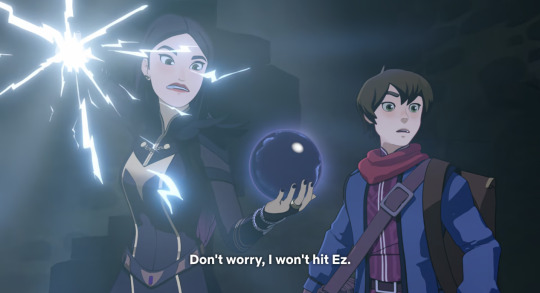
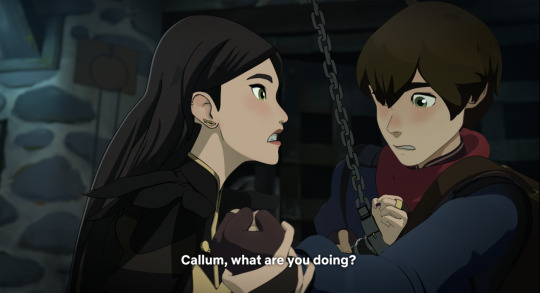
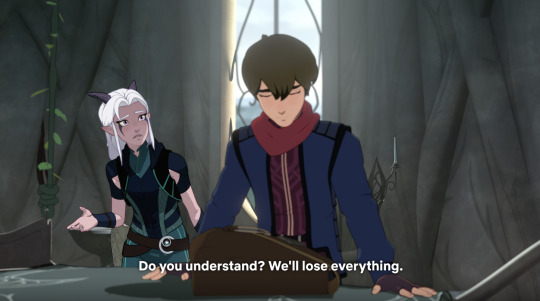
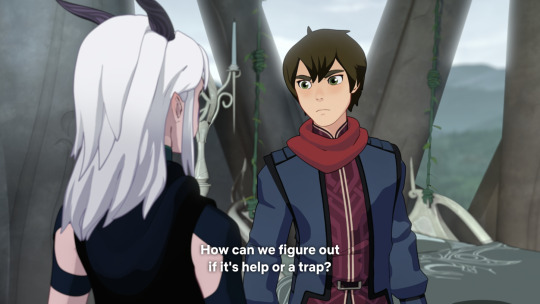
He agrees with Rayla's plan in 2x03 because he knows, somewhere deep down, Claudia betraying him is not out of the question, nor does he ever trust her with his Most Important Person (Ezran, which is later expanded to include Rayla), and if you wanna get to Callum in any significant way esp in the early seasons, you gotta get to him through that foundational bond. I've said it before and I'll say it again that, for him and Ezran (as Rayla was a neutral/negative party who didn't have any kind of real bond with Claudia or Soren at all), the illusion plan is actually pretty Mean if the mage fam siblings had been genuine.
What this tells us, then, is that Callum and Claudia pre-series think they're close... but they're not actually. Claudia rarely talks about her emotional problems to anyone until Terry, and Callum wasn't going to go to her because of his crush. There's a lack of a strong emotional bond, and I think that's one of the main reasons they fall apart so quickly when significant changes start happening. They both have strong senses of loyalty, but that loyalty was never ever towards each other... and that's fascinating, tbh.
2) Some of the inherent tension for Callum and Claudia I think, therefore, is the interplay they both have with Identity as a theme.
Callum has the first stages of an identity arc in arc 1, but it's far simpler and less demanding. He uses royal titles and systems as a way to distance himself within his own family — "Why don't you just call him Dad?" "Because he's the king. And I'm his stepson" — and finds meaning in becoming primal mage, a path both Claudia and Rayla have a hand in setting him on. Claudia, alternatively, doesn't really have an identity theme; part of it is that she's not super self-reflective, and the other half is that she's stapled her sense of self onto Viren so hard that there's not really any room for anything else.
Season 4 immediately kicks them both in the back of the knees and doesn't look back. One of my favourite things about S4 was the season explored how the timeskip took their arc 1 identity pillars — for Callum, it was Rayla (becoming a mage, becoming more confident, having a confidant/peer for the first time, etc); for Claudia, it was Viren (presumably self-explanatory) — and then shoved them together into messy reunions of "the separation changed you fundamentally, and now you're spiralling".
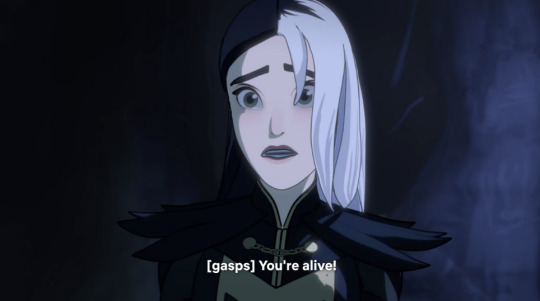

Prior to Rayla leaving, Callum was talkative and very open about all of his feelings; prior to Viren's death, Claudia was far more passively following her father's plans and ideas. But when — after a two year separation caused by perpetuating the cycle (Rayla and her self-described obsessive revenge, Viren and his grab for power) — comes to a close... the Callum and Claudia they find are the opposite, and Rayla and Viren have both very much changed, too, all of which makes reconnecting / doing relationship repair harder for everyone involved. For more on the parallels/character work between these four in S4, check out this meta; it's still one of my favourites.
Cue Rayla and Viren getting better (in some ways), and Callum and Claudia getting worse (in some ways) comparatively as they're drawn deeper into Aaravos' machinations.
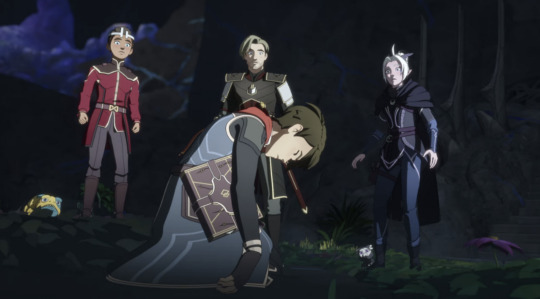
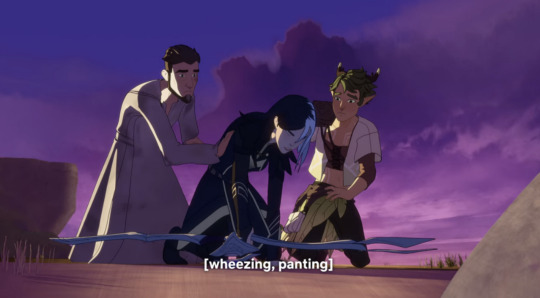
What this does, then, is set Callum and Claudia (+ Rayla and Viren) in a sprawling identity arc throughout the seasons. Rayla and Claudia continue to prominently parallel each other (both refuse to kill their High Mage of Katolis / let him die in S4, for ex) as Callum and Viren continue to parallel each other. Callum's main reaffirmations of his sense of identity is his brother and Rayla, whereas Claudia's arguably takes an unexpected distraction: as Terry and Viren become concerned with reaffirming their own sense of identity amidst actions of violence that threaten to change them for the worst, and Soren's arc 1 certainty is smashed into pieces in his bond with his sister... Aaravos and Callum become the main pillars Claudia's identity theme bounces off of, even if Callum doesn't pay her assessments of him much mind.
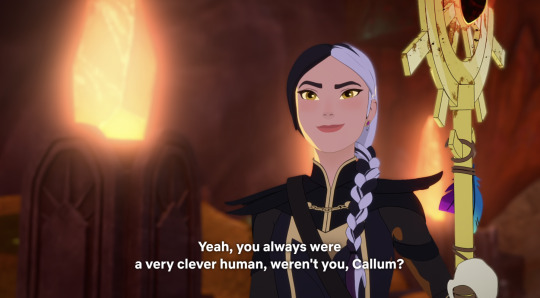
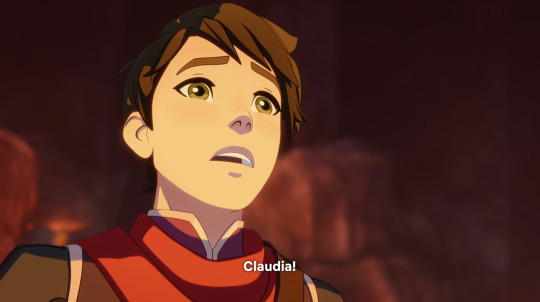
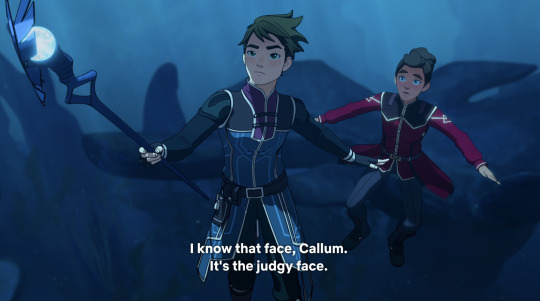
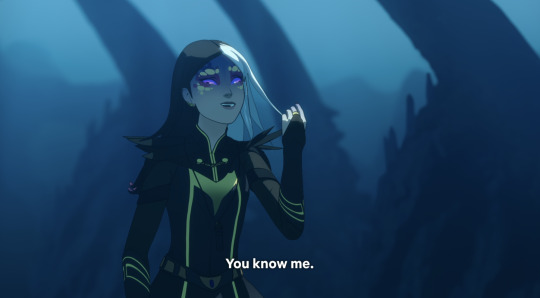
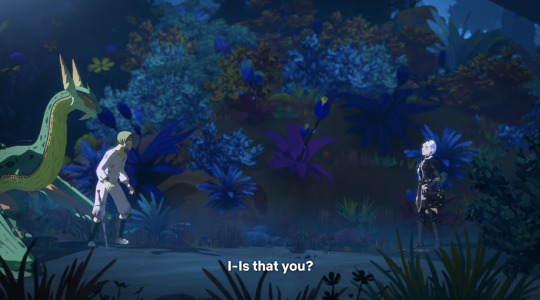
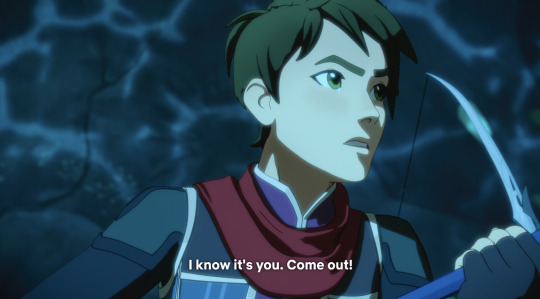
Unlike Soren, Terry, even Ezran... all people who loved and knew her (as again, Rayla had no prior bond to break) Callum has zero qualms about hurting Claudia, nor has he ever, tbh (just look at the venom in his eyes in 2x07). What we get on his end, then, is that rather than be doubtful because of past love (Soren) or being unsure of how she's gotten here (Viren: "My sweet girl... what happened to you?"), Callum is completely certain, recognizing Claudia explicitly through her capacity for violence... and her repeatedly bringing out his capacity for his own (i.e. him making sure she looks him in the eye before he leaves her to drown in 5x09). He didn't have to use the blood freezing torture spell on her, after all, but he comes out of the gate swinging with it.
What this creates, then, is a question: is the way Callum sees Claudia more accurate than the way other people see her? Is the way Claudia sees him — "I don't hate you, I don't want you dead" — real, or just a way for Claudia to still believe that she's a good person? And if it is real, is there any instance wherein Callum would believe that it is?
The irony is, of course, is that Callum and Claudia are growing increasingly similar in their methods and in their responses — while both are unaware and despairing at least a little over just how much they've changed, and could continue to. They're the embodiment of "Let's judge and criticize things other humans do, and then do the exact same thing ourselves!" Because, as they've said many times:
3) I would do anything for you.
Mages in TDP are fixers. Magic, after all, gives you the power to fix your situation in some manner. To feed, to heal, to protect, to revive. When faced with potentially losing or being unable to help someone they love in season 2, Callum and Claudia both turn to dark magic as a solution. For Callum, he convinces himself it's a one-off, but I'd always believed otherwise, lol.
Now, the mindsets both approach dark magic with is very different. It's only in arc 2 that Claudia begins to be aware of the cost ("You think I've done some awful things, and I have") but it's a price she continually chooses to pay, anyway. In some ways, this is closer to Callum's mindset regarding dark magic throughout ("It was easy. Too easy. Even though I know it's wrong"). So why do something you know/believe is bad? Simply that the ends justify, or outweigh, the means.
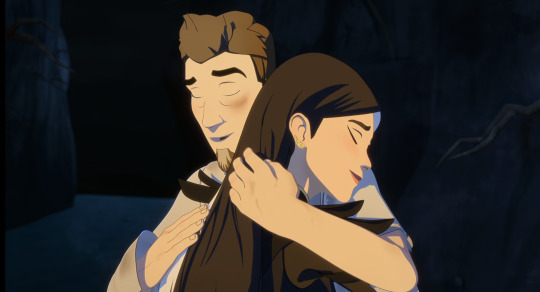
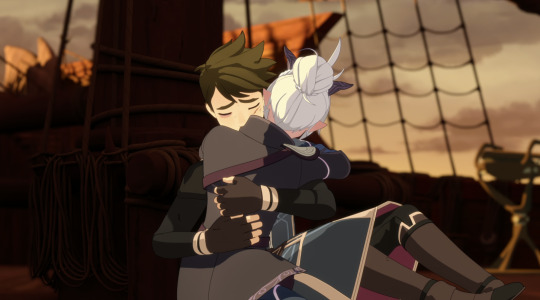
The fun part is that this parallel is set up all the way back in 1x02, wherein Callum inspires Claudia to think of the switching spell ("I'd switch places in a second") that rips Harrow and Viren apart. Callum then embodies the spell concept more earnestly in taking Ezran's place, just as Claudia doesn't understand why Harrow would be uncomfortable with someone laying their life down for him so directly if it means he'd live (cue her bafflement and anger when Viren strolls in with the same reservations in 6x01). If I can lay myself down for you, if I can save you — even if you don't want me to — why wouldn't I?
They both say "I would do anything for you" and mean it. It's devotion to the point of destruction. They're willing to sacrifice everything — their bodies, lives, senses of self — if it means the people they love will be okay.
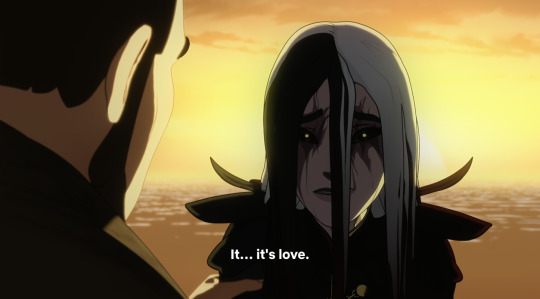

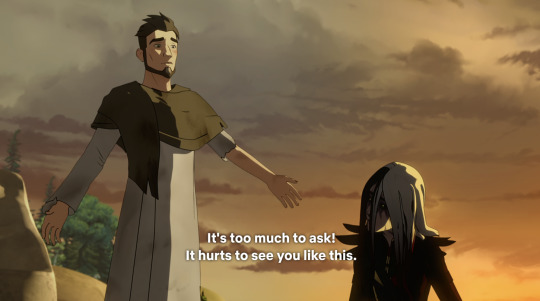
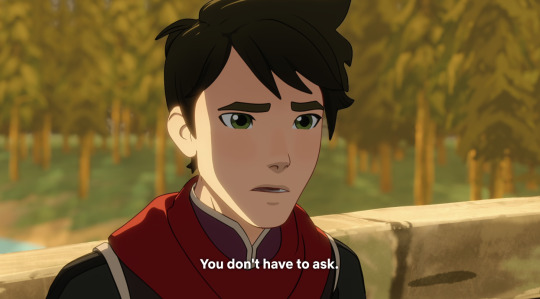
Nothing is too much to ask. After all, Callum knew Ez had the Nova Blade in 7x09, so he didn't have to carry on with the coin spell, but if it didn't, everyone in the immediate vicinity would die, and he wasn't about to lose Rayla or Ezran especially if the only cost was himself.
What this means, though, is that Callum and Claudia are both willing to steamroll over others to secure what they think is best. Callum is usually more well-intentioned about it (when he stays behind in the Bookery, it very much is for Rayla, whereas Claudia wanting to heal Soren is for him yes, but also because she can't handle it and doesn't want to acknowledge what he said about their dad) even if there tends to be worse consequences (almost dying at said Great Bookery), but they both do it (Claudia ignoring Viren's change of heart in 4x02, etc).
A good chunk of this is because they are very solution focused. If there's a problem, and they see an answer, they will hyper focus on getting to that answer by any means necessary, even if it means disregarding their own physical wellbeing or others' (Claudia in s5 with her own, Terry in s6 and s7; Callum in s2/3/7 with his own, s5 with Domina Profundis). This is also why Callum makes the choices he does in 7x02 (bigger meta on that here since I'd predicted something similar happening uh, a week post-S3 and Callum making those choices post-S5 lmao): Ezran was having big emotional problems he couldn't solve, Rayla had an emotional turned physical problem that could be readily solved, so he tunnel visions and goes for the one he can solve. (The fact that Ez had a support system and Rayla didn't + Rayla also offered to turn against/fight her people to save his dad when they first met also factored in tbh.)
RAYLA: It hurts me to know they're trapped like this. It's agonizing. But I know our mission comes first. [...] CALLUM: Rayla, we can help them. We can undo this spell. (5x04)
CLAUDIA: Wouldn't you both do the same if you had a chance to save your Dad? To bring back King Harrow? I would even help you. (5x09)
If Callum or Claudia have picked your problem as One To Solve, they will see it through to the end; if they haven't, or don't even compute something as a problem, good fucking luck getting them to care, tbh. Claudia and Callum stapling someone else's wellbeing onto their own ("Why are you doing this?") is just what they do, even if that means someone else's sliding by well, the wayside (Terry, Ezran) because again: who's in their way? Who's problem can they actually fix?
This does mean that sometimes there can be collateral damage if they've decided hurting you doesn't matter, to the point we've both seen them willing to inflict unnecessary physical pain on other people.
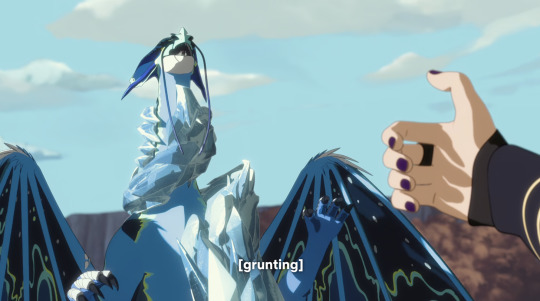
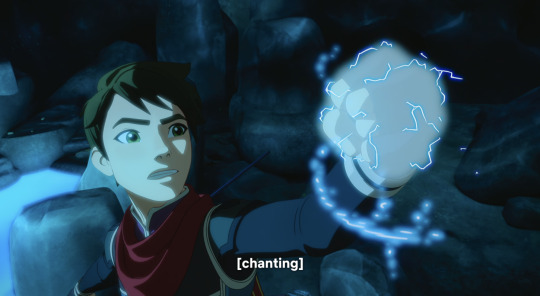
They also as of the end of S7 have inverted hair — Callum's mostly dark hair with his white streak, Claudia's hair mostly white with a few black streaks left — which is an absolute treat from a foils and narrative standpoint, lemme tell you. I can't wait to see what fucked up shit they do in arc 3.
But now for what I think I've been dancing around long enough as a semi-closing note:
4) You can't really talk about Claudia and Callum without talking about Rayla... but because of Raydia, not Rayllum.
Rayla and Claudia are foils, and they always have been.
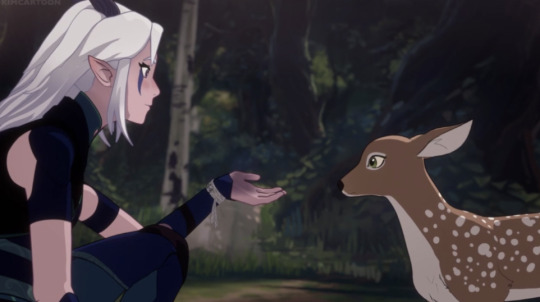
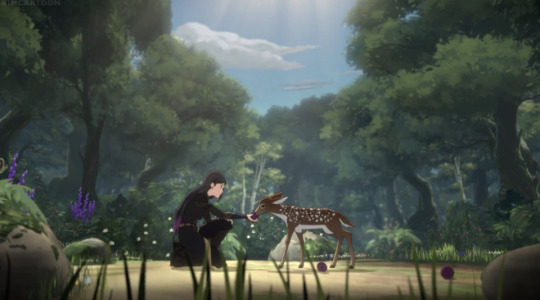

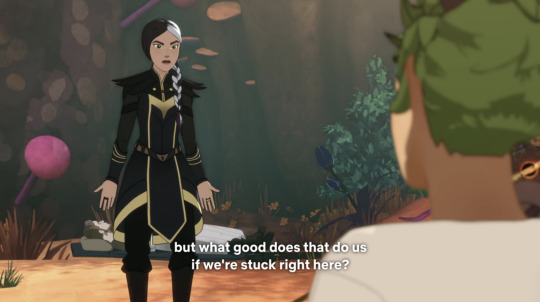
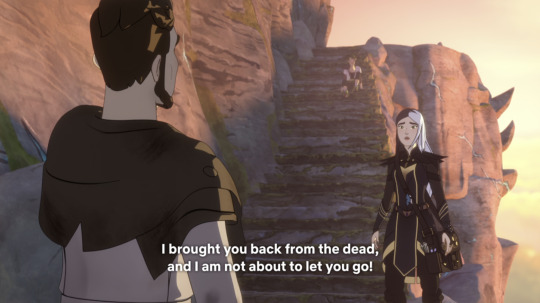
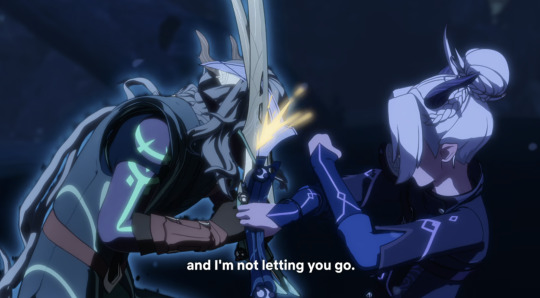
They enter the story similarly as antagonists — dark mages and assassins have similar story purposes within TDP, after all, being willing to sacrifice themselves and others for what they deem important enough ("so I could carry out my dark work" / "I have work to do") — but where Rayla immediately breaks from her father's orders, Claudia clings steadfastly to them. They offer drinks to their travelling companions (1x04), grapple with what to do with Callum (2x02—2x03), work to save their fathers while being submerged in water (5x09, 6x09), abandon their boyfriends (Rayla to protect him, and Claudia to protect herself), and as Claudia's hair becomes white, she physically looks more like Rayla as well.
But where Claudia is a mage — a fixer in mindset, willing to discard her heart to follow her mind and sacrifice others — Rayla is primarily guided by her big heart and willing to sacrifice what she finds important — her family, Callum — as well as herself. Claudia (like Callum) cares about her loved ones above all else; Rayla cares about everyone else above all else ("My heart for Xadia").
RAYLA: I let him go. I don't know why. EZRAN: Because you felt for him. [...] You saw that he was scared, and you knew he was a person, just like you.
CLAUDIA: You're right. It won't follow us. But not because it's trapped. [Smiles] It won't follow because it's afraid of me.
What this provides then is a clear way at how they're both lancers for Callum within the narrative. A lancer is the primary character contrasted with the main character — if the hero is earnest, the lancer will be snarky; if the hero is nervous, the lancer will be more bold / confident — in order to provide balance and change. When Callum is more passive, unsure, reserved, or feels helpless (1x03, 1x09, 2x03, 2x07, 3x01, 3x09, a good chunk of smaller instances in S4, 5x08, 6x06, 7x02, 7x06) Rayla and her choices or circumstances is often used to prompt (and/or force) him to take action. She's his primary agent of change with the narrative and always has been... but, sometimes, so is Claudia.
After all, Callum's love for Rayla motivates him to move closer to Claudia, not farther away. In 2x02, when his crush is offering to spend more time with him and fix his problem by teaching him dark magic, Callum refuses... but it's his love for Rayla in 2x07 that leads to him picking that book right back up and actually doing it.
CALLUM: I'm sorry. It's just not for me. (2x02)
DARK!CALLUM: It's not about you, is it? If you love her, you'll be the you that can save her. You'll do what you must. However dangerous, however vile. (7x06)
VIREN: If it's love, then nothing else matters. Do what you must. (6x06)
At the same time, Rayla illustrates why Callum and Claudia fell apart. Even when she's made mistakes or lied/left, Callum knows that everything she's ever done has been to protect him and Ezran, and in 7x02 is to protect/save her family. She lays herself and only herself on the line all the way until 7x09, where the conflicting messages of "I sacrifice so Callum doesn't have to" meets "Callum — who always tells me not to sacrifice things — is telling me to sacrifice (him)". These things aren't true of Claudia, who lies to use people (Callum and Ez in S2; Terry in S7) around her with varying degrees of being literal, and her increasingly high body count. Rayla isn't concerned with being a good person (that would require having a stable sense of self that she cares about, which is too much self esteem for her, lmao), but Callum and Claudia are attached to thinking of themselves as good people (and/or potentially in Callum's case, that being synonymous with being someone Rayla 'can love'); Callum is willing to sacrifice it, while Claudia clings to it to her last breath.
Therefore, all three of them have a very interesting interplay with each other on themes of choices and abandonment and TDP's whole thing with sacrifice.
CHOICES: Claudia fears having to choose; Rayla fears making the wrong choice; and Callum fears having no choice at all.
ABANDONMENT: Callum is abandoned but never truly abandons (he might walk away physically but never emotionally); Claudia would always pick to be abandoned rather than abandon (with the exception of 6x01); and Rayla always leaves / is more willing to leave.
Take, for example, Rayla in 4x05 in leaving the drake being what Callum and Ezran were willing to do point blank in 2x07; she's borrowing their selectiveness but chopping off parts of herself in the process, as Callum only went back for the dragon that Claudia was going to dissect because Rayla did so. Callum takes the first half of Claudia's fulminus spell in 1x03, but Rayla helps him complete it in 1x07.
Aaravos' possession chokes/suffocates Callum in 4x04, something that only happens because Callum did dark magic for Rayla with Claudia's book; Rayla chokes in 5x09 going under the water (Callum's Ocean arcanum, Claudia's submergence in Aaravos' literal waves of grief); Claudia chokes/suffocates as well in 5x09 because Callum steals her potion; Claudia then suffocates Callum in 7x07 with the Staff of Ziard by more water he's later going to pick the staff up out of because of his love for Rayla. Claudia gifts Callum the letter that she only has because Rayla kicked it out of his hand, a bad action that likewise delayed him learning more about Aaravos (which is a good thing), only for Claudia to use it as a tool of deception whereas now Rayla is entirely honest... Everything is interrelated; everything is contingent.
Callum chose Rayla because he could trust her with Ezran, and after Claudia scared Ezran, it was over, but that foundation allowed Callum to build a bond with Rayla that could compete/convene with — and under specific instances, be prioritized over — his bond with Ezran (Callum lacking a vengeful bone in his body and having made his peace with Runaan similarly to Zubeia/Avizandum also helped), similarly to way Claudia's bonds with other people have competed and/or taken precedence (Viren and then Aaravos above all else, leaving the boys and her brother and boyfriend by the wayside).
It's not necessarily the healthiest way to live and have relationships — Callum in particular loves in a Very intense way (i.e. if you're not Ez or Rayla, you're on a varying scale of chopped liver to him) — but damn if it's not interesting to watch.
Other Little Callum x Claudia Things / Closing Notes:
Claudium is always more interesting to me from Claudia's POV. In my view she likes him well enough, and doesn't not not like him, but it's not a very strong crush; Callum is comforting and comfortable and it'd increase her status. Her still holding onto not wanting to hurt him is interesting as well since, as discussed, he hasn't. Callum reaching out to Claudia in 4x08 and 7x07 of "stop / you don't have to do this" is especially funny to me because there's little doubt in my mind (especially post-S4) that if she did listen to him, he'd absolutely use it against her and immediately go for the jugular. They hate each other in a way that's not entirely rational, and it's awesome.
Love the fire and water symbolism they have going on, especially with the fight in Akiyu's grotto in 7x07. Claudia increasingly becoming more and more associated with fire throughout the series vs Callum getting more water associations is juicy, particularly considering since she got swallowed up and spat out by the ocean in 5x09 whereas he got an arcanum he'd likewise rather not have.
Callum and Claudia's tendency to knowledge steal from each other — Callum taking her primal stone and her book; Claudia taking his answer to the riddle; the trio stealing the prison, Claudia basically gifting the Staff of Ziard to him an episode after claiming it was hers (more on that here) — is delicious. The fact that map shit came back full circle — "the being will guide you to the one who has answers" "having knowledge doesn't mean knowing knowledge, so it means he has a map" the cube of Aaravos being a literal map that leads to Elarion (which is what I'd always hoped for since S4) — is just the cherry on top.
Can't talk about them without talking about the chain motif, whether it's how they mutually chain each other in 1x03 (Claudia grasping his wrist, Callum fitting an actual chain over hers), the snake chain spell that continually haunts Callum throughout, dark magic as something that promises freedom yet also chains/traps you... Callum and Claudia both using magic in S7 to immobolize / imprison their siblings, but Claudia and Ezran both choose not to kill them, and Callum asserts that he's not giving up on them ("but I'll always be your brother") while Claudia spirals about it ("so you've given up on me?").
And finally personality flaws because hoo boi. Claudia hates feeling judged in any manner (again, very attached to seeing herself as a good person) but canonically thinks that Callum is judgemental on more than one occasion and he absolutely can be. Think of how he should logically trust in 4x01 that Soren wouldn't let anything bad happen to Ezran, but he 100% does not and gets aggressive and intensive anyway. Callum also doesn't like dark magic either (whereas again, Claudia does revel in it and think it's great for a good chunk of arc 1), so while in a world with no assassination he might've become a dark mage alongside her, he would've been a lot more "we shouldn't be doing this" about certain stuff, which would've majorly bothered her, until their or his motivations matched up, wherein he'd go just as far or farther than her, which would also majorly upset her. Basically: I think they're too similar and clash in very particular ways that it'd take massive character development from both of them to work out longterm and to not give up on the relationship. Whoops?
I'd like to write a drabble or oneshot one day where they're both committed to defeating Aaravos (maybe Claudia finds out he killed Viren in 6x08) but the spell required is like... a pretty horrific path that none of their other allies really want to walk, so they do it together while hating each other and angrily bonding the whole time. An interesting way for Claudia to let go of her distaste for him judging her would be to think/realize they're equally fucked up / willing to go that far, and Callum not feeling like he has to hide any of his monstrosity in front of her (because I think that's less of a concern post-S7, but it's still there, even if Rayla would absolutely accept him no matter what it hasn't quite clicked for him yet) and he thinks that'll make him feel better, but it doesn't anyway because he doesn't really want to Be this, either. Neither of them do, but... hand in unloveable hand, I suppose.
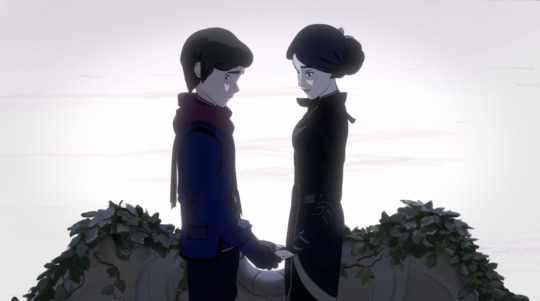
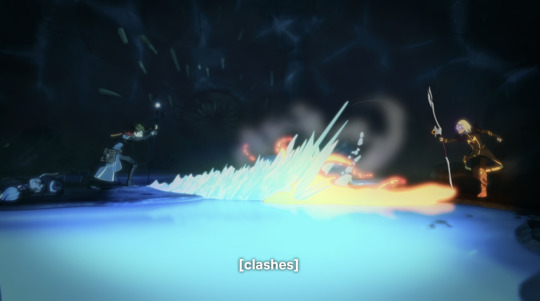
Because again: I love the mess.
#thanks for asking#tdp claudia#tdp#requests#tdp callum#callum x claudia#the dragon prince#stardustamaryllis78#analysis series#callum#claudia#analysis#where can i put it down?#didn't even talk about 6x09 ending with them doing the same spell (which was also predicted ahead of time lmao)#claudia: love? i don't know how to do that-#callum: [is all he knows how to do come hell or high water]
27 notes
·
View notes
Note
i'm humbly begging for tips on how to plot/structure a long-fic 🙏😔
ok please do not take this as law whatever, because I have been told time and time again that my process is insane and very antithetical to a lot of creatives but that’s how I work on literally all of my long projects SO. neuroses be upon ye below the read more.
I’m a hardcore planner and don’t like to start things without clear direction. If I’m planning something long that isn’t a self contained story, this is how I visualize it. It’s sort of the way that weekly serialized TV works, probably because I went to film school and used to want to be a showrunner, so I approach it with the mindset that I am the showrunner of my own weekly serialized one man show

And then each “story” is broken down like this:

(Keep in mind the beats above are very metaphorical. Funhouse just means the key facets of their character are on full display, like evasiveness or whatever, and seeing how they interact with the overall physical events of the world. Bad guys isn’t always bad guys, it’s just the looming threat, like a deadline)
Now onto the actual process. This is through the lens of shippy fics so it’ll usually be using terms/goals within that context!
“The thesis” is the first thing I decide and with and when it comes to fic it’s often a ship. It’s just the overall goal or point of what you’re writing. If you’re writing a shippy fic, your thesis is “X and Y Character get together” and everything that happens within that thesis is ultimately in pursuit of them getting together and then their happily ever after. The complexity of what happens for that to come into fruition is up to you.
“Thing I want to have happen” is usually a progression of a romance beat or the development of the relationship. Awareness of feelings, kissing, sex, etc.
“The story” that happens is the set of circumstances that lead to those beats, and for longfic pacing, I find it best to have each of these be thematically self-contained narratives to push things along.
Here’s an example:
Joe is in love with Brad, and they are in high school. “Story 1” they are paired together for a school project, and by the end Joe realizes that he enjoys Brad’s company, and invites him to his party. “Story 2” is Brad getting ready for the party, working up the courage to go, and then they play spin the bottle. By the end, Brad realizes that he likes kissing Joe. “Story 3” Joe has been avoiding Brad because kissing made him feel weird, but then he finds out they’re rooming together on a school trip. After they spend time together, they mutually realize they like each other and want to date; and screw. Then they go to prom, happily ever after”.
You have 3 separate situations with 3 different developments in Joe and Brad’s relationship. This sort of idea can be expanded to galactic scale, because ultimately when it comes to anything about people, human drama is all relatively the same. I think the important thing for longfics, both for keeping yourself interested and others, is providing some closure for some threads while opening up new doors, and this is conducive to that.
As for the individual story structure, that’s just how I plot everything self contained, it’s Blake Snyder’s Save the Cat Beat Sheet. I like compared to other plotting structures specifically because of “Theme stated, Fun and Games/promise of the premise, midpoint, and dark night of the soul.” I find that each of these are really conducive to understanding how to propel a story forward when you’re stuck, which can happen often when working on big projects.
Theme stated is usually what the characters need to learn, stated by someone else. It’s less a motif present and more of an emotional goal that the protagonist isn’t emotionally aware of and is resistant to. In romance it’s usually “you need to open yourself up more” said by a friend. This is usually a good thing to keep in mind in each scene, because sometimes if you write yourself into a corner; you can fall back on this and try and work out what your character can do next. Is Joe antisocial and needs to learn to trust others? and you’re not sure where to take it? Have him try being avoidant to Brad during their partnership, and Brad push back against that. Additionally, a great way to add drama is to have characters fall back on their old ways/not ingest the lesson of the theme.
Fun and Games/Promise of the Premise: basically just shennanigans that happen based on what you’re setting out to do. If Brad and Joe are working together, it’s the moments that arise from that. Moments where they clash, or go to the library, or one of them skips out on doing the project. Anything that they could experience while working together, as well as the romance implications of that. Bad guys close in is an extension of this—usually a deadline is approaching.
Midpoint: when everything seems great. For example, say you don’t know where to take Brad from the Fun and Games, have them create a really good project! They’re finished working, and realize they enjoy each other.
Dark Night of the Soul: they lose the project, they fight, Brad doesnt show up for the final practice and Joe feels betrayed. Anything that sets them emotionally back to square one, and then something happens to rally them once again to finish their school project.
In a big project, the big emotional issues may not be fully resolved from this, but from a plot basis, it gives you an idea of how to keep plot-based emotional momentum that all works through the ultimate development of the the thesis.
The theme of each arc should be different as they start to learn new things, because rehashing the same material doesn’t keep that momentum you need. So, if Joe learns to open up in arc one, maybe arc 2 is about him examining what he actually wants out of relationships with others.
Fic is a great place to do this because there’s so much shit you can mine for each story arc, and is really rewarding to readers when you bring it into play. And if you run out of that, eventually you can mine older arcs you write and bring their content back into play too. When you do this it basically allows you to have infinite arcs and shit if you want which is fun, and how TV shows go on for ages, for better or for worse
Anyways hope this is as in any way helpful! This is just how I do it haha
31 notes
·
View notes
Text
The Good, the Bad and the Ugly: all of my thoughts (part 1)
All right, this is me, watching my way through my current obsession The Good, the Bad and the Ugly for the umpteenth time and rambling about everything that comes to mind as I go, which ended up with me typing over thirty thousand words because I am incapable of shutting up. Because that is truly excessive, I will be posting my thoughts in three parts; this is part one (covering roughly the first hour and thirteen minutes of the Extended Cut, up through the end of the desert/carriage sequence), and I'll probably post part two in a few days to a week, pending editing and such and some of the other things I should be doing.
Because that's a lot of reading to commit to without knowing what you're getting into, especially if you're here from the tag, here's what to expect in brief:
This is all of my thoughts, simply whatever comes to mind, but my thoughts on fiction tend to be heavy on in-depth analysis of characters, their motivations and how they tick, so a lot of this falls into that general category.
In particular, there will be a whole lot of thoughts on Tuco, Blondie, and their evolving character dynamic, which is my favorite part of the movie. I will not be looking at it through a shippy lens, for what it's worth (romantic shipping is not generally how I personally engage with fiction), but I hope anyone who finds their dynamic compelling in whatever way might still enjoy some of my thoughts on them!
In between, there's also a bunch of other commentary on stuff like the narrative function of scenes (especially on the scenes that were cut in the International Cut of the film and whether the film is better with or without them), directorial or editing or production design or storytelling choices, acting choices, foreshadowing and parallels, as well as some lighter commentary on bits that amuse me or bug me or that I particularly enjoy.
Sometimes I will just be making observations about random things I didn't necessarily notice or pick up on on my first viewing; many of them are probably kind of obvious, but if I didn't pick them up seeing it once, probably there's at least a chance they might be interesting for other people who have only seen it once.
This is not a recap of the movie, but I do try to quote lines or explain bits that I'm commenting on, so hopefully you can follow along if you've seen the movie at all. I don't know how coherent this would be if you haven't seen the movie, but if you choose to read a post like this about a movie you haven't seen anyway, godspeed to you.
Tuco's introduction
The opening scene sure is a microcosm of Sergio Leone's directorial style. Slow, silent close-ups, wide shots, unclear exactly where the scene is going initially, these unnamed characters eventually converge on a saloon -- and then instead of following them inside, Tuco comes crashing through the window and we freeze-frame. It's very drawn out (I had a bit of an "Is the whole movie going to be like this" moment watching it for the first time), but the comic timing of Tuco and the freeze-frame is great; instantly we go from this super slow, dramatic buildup to this fun, humorous subversion that really sets a tone. All that buildup was actually for introducing this guy.
In the process, we learn that 1) Tuco is someone at least three different people want to kill, 2) he's someone skilled and resourceful enough to manage to shoot them first and then make his escape through the window even after being caught unawares during a meal by three people working together, and 3) even in the process of doing that he brings his food with him -- probably actually pretty revealing about his background of poverty, not wanting to waste food when he has it. We'll of course see him introduced further a little later, but this really says a lot for only actually containing about ten silent seconds of him, and also benefits from being funny.
It's kind of amusing how bloodless most gun deaths are in this movie, considering it doesn't shy away from blood in other parts. The surviving bounty hunter does have some blood on his hand as he tries to shoot after Tuco, probably to convey that he's injured despite still being alive, but the others are just cleanly lying there with no signs of damage. Maybe it's paying homage to what other Westerns looked like -- the actual cowboy gunslinging specifically is very idealized, sanitized and almost cartoonish, compared to a lot of the other violence in the film. I remember being a kid and hearing about the trope of people in old Westerns getting shot and dramatically going flying as a result, despite that normal bullets are far too small for their momentum to send a person flying anywhere -- you don't actually see too much of that in modern movies, where everything tends to look much more realistic, but this movie definitely has a lot of very dramatic flailing and spinning around when people get shot in a way that looks pretty distinctly silly and cartoony today. Ultimately it meshes pretty well with the overall tone of the film, though; this movie is gritty in many respects, but it does not aspire to realism.
Angel Eyes' introduction
The way Angel Eyes just silently waltzes into Stevens' home and helps himself to some of his food while maintaining eye contact the whole time is so weird and uncomfortable, it's delightful. What an entrance.
Stevens has a limp. People who have fought in the war tend to be visibly scarred by it in this movie -- truly something that just permeates every background detail, that you don't really think about on a first viewing when you think the Civil War is just a setting backdrop.
There is zero dialogue in this film until more than ten and a half minutes in (though the first three minutes of that are the opening credits, so it's seven and a half minutes of actual movie with no dialogue). I think this is a very fun choice which contributes to the viewer really feeling how unbearable the silence is for Stevens by the time he starts asking Angel Eyes if Baker sent him - half of that silence wasn't even technically part of this scene, but it really intensifies it by making the silence here feel even longer than it is.
When Stevens says, "I know nothing at all about that case of coins!", Angel Eyes looks up with interest from where he'd been casually looking at his food. Evidently he had had no idea there was any case of coins involved, only that he was meant to collect a name, but once Stevens mentions it, his interest is piqued.
Angel Eyes casually offers, "Well, Jackson was here, or Baker's got it all wrong," while cutting off and eating a piece of bread with a large knife, sort of implicitly daring Stevens to try to say Baker's got it all wrong and see what happens. When he's got Tuco captured later, Angel Eyes does a similar thing of staying friendly-threatening as he casually asks questions, but once Tuco actually refuses to talk of his own accord, out come the claws. This time, though, Stevens does not take the bait, probably sensing that that would lead nowhere good for him.
He says, "Maybe Baker would like to know just what you and Jackson had to say about the cash box" -- this isn't the info he came for, but maybe Baker would be interested. Really it's Angel Eyes himself who is intrigued -- he'll go on to tell Baker that that's my bit. But he doesn't really bother pushing Stevens for it, instead moving on to admitting he's being paid for the name specifically. Probably he figures once he gets the name, he'll have all the info he needs to track him down anyway by his usual means (which it turns out he does).
The casual, grinning confidence of Angel Eyes' assertion that if Jackson weren't going by an alias he would've found him already, "That's why they pay me," really makes you believe it, doesn't it. It's exposition about what Angel Eyes does, but is also executed to work as a nice character-establishing moment about his competence.
Christopher Frayling's otherwise fun and informative commentary on the film talked about how Angel Eyes' missing fingertip was provided by a hand double in the final truel -- but you can see in this scene that Lee van Cleef's own right hand is definitely missing that fingertip (though I did not notice it at all until I thought to specifically look for it). Very curious where the notion of a hand double came from -- he even named a specific guy.
Angel Eyes casually announces that when he's paid, he always sees the job through, even though that's just going to make Stevens desperate -- Angel Eyes knows he can shoot first, no big deal.
He shoots Stevens through the table and the food, even. How does he aim.
Angel Eyes grabs his gun and turns around to shoot Stevens' son before he actually comes into view (specifically, we see him start to react to something about ten frames before we can first see the tip of the son's rifle). Presumably, in-universe, he heard him coming, but we don't hear him coming at all over the blaring background chord, so it feels like Angel Eyes just knows he's coming by some sixth sense. Very effective at making him seem even more threatening, especially since there's also generally a conscious decision in this movie to act as if the characters can't see anything that's out of frame for the viewer -- Blondie and Tuco get caught out by that rule a couple of times in amusing ways, but Angel Eyes actively defies the auditory equivalent.
(It's neat how the family photo, used for Angel Eyes obliquely threatening Stevens' family, also serves as foreshadowing for the fact he also has this second, older son we hadn't seen yet at that point.)
The fact Angel Eyes sneaks into Baker's bedroom when he's sleeping to report back is so extra. A normal person would just arrange to meet him the next morning, but no, Angel Eyes does the creepy stalker thing. Probably makes the murdering him in his bed bit a little easier, though, which also suggests he was definitely intending on that bit the whole time and didn't just "almost forget".
Baker's brow furrows and his eyes shift uncomfortably when Angel Eyes mentions the cash box; clearly he was hoping Angel Eyes would never find out about that bit (very reasonably, given what happens next).
All in all, Angel Eyes' introduction is super striking. The casual veneer and smug grins painted over a deeply tense sense of threat; the absolute deadly confidence; the fact he shoots Stevens' son too so easily and presciently, almost as a footnote to it all; casually walking out with the money that Stevens offered him for sparing his life; and then, on the ostensible basis that when he's paid he always sees the job through, casually killing Baker too.
Although he explains the murder of Baker as simply seeing the job through, though, Stevens didn't actually ask him to kill Baker; all he ever suggested he wanted was to be left alone, and all he said about the money was that it's a thousand dollars, after asking what Angel Eyes was being paid for murdering him. I expect Angel Eyes simply chooses to take it as payment for the 'job' of killing Baker for motivated reasons; that way, he can act as if the money is still 'payment' for him even though he rejected Stevens' attempt to bribe him, and it's much easier to go after the cash box himself if Baker's out of the picture, after all.
This creates an interesting ironic sense that while Angel Eyes effectively presents his own introduction as being all about his unassailable professional principles about always performing the job he's been paid for, and I took him at his word on my first viewing, he's not really all about those principles at all -- and as the movie goes on, indeed, he's simply pursuing the cash box for his own reasons rather than because anyone's paying him for it. His 'professional principles' don't come up again, because that's not really what this intro was telling us at all.
Which isn't to say he doesn't always see a job through after being paid (I can definitely believe that; if he has a reputation for getting the job done no matter what, that makes people more likely to pay him in the future, and he sure has no qualms about completing any job), just that that's not at all the main thing driving his character, as you might initially assume. The thing his intro is really telling us about him is that he's ruthless, terrifying, extremely competent, very interested in this cash box, and has absolutely no trouble casually murdering whoever might be standing in the way of accomplishing what he wants. And I think it's very effective at showing that.
Blondie's introduction
This scene opens with Tuco on a galloping horse in a way that naturally invites the viewer to assume this is following directly from when he flees from the saloon in his intro, and that's what I assumed on my first viewing -- but nah, not only does he not have the food and drink, he's wearing different clothing. Given the surviving bounty hunter from the intro will be appearing later and indicating that was eight months ago, and this is decidedly the most obvious place for the bulk of the timeskip to be happening, probably this is actually several months later. This film is not at all big on time indicators -- for the most part, we have no idea how much time is passing, everything feels like it's happening pretty much in sequence, and we can only vaguely infer that there must be longer gaps between particular events.
The straight-up photograph on Tuco's wanted poster is pretty hilarious. There's even a scene later with a little gag about the long exposure times for photographs at the time. Probably this is just a funny prop for two scenes to make it very obvious to the viewer that it is absolutely him on the wanted poster even as he adamantly denies it, but it's also very funny to imagine Tuco patiently posing for his own wanted poster.
Framing through it, all three of the bounty hunters surrounding Tuco when Blondie comes along are in fact going for their guns when Blondie shoots them, which makes sense -- for all that Blondie is not much of a noble hero, he generally does not tend to shoot people until they're at least starting to draw on him. (There's one notable exception, which will come up in part two.)
I enjoy Tuco's weird little nervous, disbelieving grin as he realizes this stranger just shot the bounty hunters but is sparing him. Tuco's own worldview, as shaped by his background, is dominated by self-interest; it's every man for himself, and it's up to him to do whatever it takes, tell whatever lies, betray whoever he has to, to get ahead. And yet, there's this endearing naïveté to him, where he's not really suspicious of other people's motives accordingly -- he's surprised Blondie would save him, but his brain doesn't immediately go to this guy just wants to be the one to collect my bounty. We see this a lot throughout the film.
We cut (with great comic timing) from Blondie sticking a cigar in Tuco's mouth to Tuco spitting out a cigar while tied up on his horse as Blondie takes him into town -- an edit that suggests continuity, like only a short time has passed and it's the same cigar that he just hadn't had the chance to spit out yet (sort of dubious if you really think about it, since surely it would've taken a bit for Blondie to tie him up and get him onto his horse). This reinforces our initial assumptions about what's happening, where Blondie would just have tied him up before riding straight into town, but given the con they turn out to be running, there must have actually been an offscreen conversation about it and the cigar is there as a bit of cheeky misdirection for the audience.
(It probably makes sense that when Blondie put the cigar in his mouth, he was actually about to propose they run this bounty scheme together -- as the movie proceeds, we see that Blondie generally shares cigars in more of a friendly sort of way, after all.)
"I hope you end up in a graveyard!" yells Tuco. They sure do all end up in a graveyard! This is some very cheeky foreshadowing and I love it.
Tuco yelling ineffectual threats about how Blondie can still save himself by letting him go, while actually tied up and completely at his mercy, is just extremely Tuco.
Then he shifts tack very abruptly to saying he feels sick and needs water, only to then spit in Blondie's face. Later he furiously calls the deputy a bastard just for walking out of a building, only to then immediately shift to saying he's just an honest farmer who didn't do anything wrong. Tuco often does this, shifting from one approach to the next in a way that makes it really obvious he's bullshitting, but he keeps doing this, just throwing shit at the wall to see if anything sticks, even when this is counterproductive to the whole effort. He is presumably playing it up a bit here, but it's still in its own way pretty representative of who he is and what he's actually like. He's so characterful.
"Who says so? You can't even read!" says Tuco about whether it's him on the wanted poster, which is some delightful nonsense hypocrisy/projection given we will later see that Tuco himself can only barely read. I love him. (And why would reading even have anything to do with it; he's obviously looking at the plain actual photograph of him right there. Love Tuco's absolute nonsense.)
Another absurd change of tactics: "Hey, everybody, look, look! He's giving him the filthy money!" - as if he's going to rally onlookers against the sheriff and Blondie somehow on the basis that money is exchanging hands, isn't that suspicious.
Tuco calls Blondie Judas for accepting the money (referencing the thirty pieces of silver, of course), which will get a fun echo later.
"You're the son of a thousand fathers, all bastards like you!" I love that Tuco has invented compounding recursive bastardry just for Blondie. Not only is he a bastard, all one thousand men his mother slept with were also bastards. Glorious. (You can see Blondie's amused by this one; he actually smiles a little bit before throwing a match at him.)
I wonder if Blondie actively encouraged him to go quite this hard on the insults, to make them look less associated, or if he just did this. One would think it would be risky, on Tuco's end, to be this over the top in literally spitting in the face of the guy who could just let him hang if he happened to change his mind -- but then again, Tuco genuinely doesn't expect Blondie to double-cross him.
Tuco's crimes, as of this first hanging, are: murder; armed robbery of citizens, state banks and post offices; the theft of sacred objects; arson in a state prison; perjury; bigamy; deserting his wife and children; inciting prostitution; kidnapping; extortion; receiving stolen goods; selling stolen goods; passing counterfeit money; and, contrary to the laws of this state, the condemned is guilty of using marked cards and loaded dice! All this paints a picture of a pretty colorful backstory, but most of it is relatively petty; other than the murder (possibly of people like the bounty hunters we saw him dispose of in the opening), we can gather he's been scrounging up money through anything from cheating at cards up to armed robbery and kidnapping, he lied under oath (checks out), he set a prison on fire (presumably to escape), he ran off from his wife and kids and then married someone else he presumably also ran off from, and then there's "inciting prostitution" which I'm guessing means offering someone not previously engaged in sex work money for sex.
It obviously checks out that he'd do anything for money, and bigamy and deserting his wife and children rhyme with his off-hand mention at the monastery later that he's had lots of wives here and there; in general, it tracks that he would make big commitments and then just break them. So all in all, these seem like probably a bunch of genuine crimes that he actually committed. (He also nods somewhat smugly at the marked cards and loaded dice bit.)
Blondie's MO seems to be to first shoot the whip out of the hand of the guy who's meant to be setting the horse off and then shoot the actual rope (and then random attendees' hats, for good measure). Better hope that first shot doesn't spook the horse.
It really is very reasonable of Tuco to want a bigger cut for being the one running the risks; you wouldn't generally want to do a job with a significant chance of getting you killed without being very well compensated for that. Unfortunately, Blondie doing the cutting means he's the one with all the power here -- if he's dissatisfied with his share, he can just pocket all the money and let Tuco die -- which puts him at the advantage in the negotiation, and he knows it.
I enjoy how in the middle of "If we cut down my percentage, it's liable to interfere with my aim," Blondie offers Tuco a cigar, this casual friendly move in the middle of what is effectively a threat.
Tuco does a little understated, "Hmm," of acknowledgement that makes it feel like this was genuinely unexpected. But then he just returns the threat: "But if you miss, you had better miss very well. Whoever double-crosses me and leaves me alive, he understands nothing about Tuco." Which sets up his quest for revenge on Blondie after the double-cross, obviously, but is also fun to recall during the final scene: Tuco actively advised Blondie not to leave him alive if he was going to double-cross him.
Tuco why are you eating the cigar
Next time he's in the noose, it's for a whole new list of crimes that ends with, "For all these crimes, the accused has made a full, spontaneous confession." Yeah, he probably just went off spewing confessions to a string of colorful invented offenses as Blondie brought him in, didn't he, maybe hoping it would raise the bounty. (At the cinematic screening where I saw it for the first time, I missed the spontaneous confession thing due to no subtitles and spent half the movie experiencing some jarring mental dissonance over Tuco's growing goofy likability versus the offhandedly having been convicted of multiple rapes near the start thing. But it's actually pretty strongly telegraphed that the new crimes here are simply bullshit; a spontaneous confession to a variety of new things that were decidedly not on the earlier list, that he could not possibly have done in the implied presumably not very long timespan between the first and second hanging, mostly distinctly more dramatic crimes than the original set, all sounds strongly like a Tuco throwing shit at the wall thing.)
Tuco looks a lot more restless during the second hanging, where for the first one he was pretty calm -- probably a little bit nervous about Blondie's "liable to interfere with my aim" remark, even though they'd presumably come to an agreement to stick with the 50/50 split.
He notices a woman being scandalized, seems sort of put out for a second, but then growls at her to scare her more. What a Tuco.
Another minor character presumably disabled in the war: Angel Eyes' incidentally legless informant. (Whom he calls Shorty, like the guy Blondie teams up with later, who is definitely a different guy because that guy has legs -- sort of a funny aversion of the usual one Steve limit. Genuinely a bit puzzled by why they did that -- is it like that in the Italian version or just the English dub?) I wonder if the bit where he moves around by holding a couple of bricks and using them to walk on is something inspired by a real person or people at the time.
Calling him a 'half-soldier' is pretty rude, Angel Eyes.
Look, I'll accept that we're calling Blondie Blondie, sounds like that's what you'd call him in Italy, but there's really no excuse for "A golden-haired angel watches over him." The man's hair is brown. It's not even a light brown. What are you talking about, Angel Eyes.
But to not get too distracted by that part of the line: Angel Eyes obviously recognizes the con they're running. I think that's probably because he knows of Blondie and that this is a thing he does (he's presumably done it with others before), so when he notices Blondie's around at a hanging, he's like ah, yes, there's him doing his thing, guess he's running with Tuco now. My own feeling is Blondie and Angel Eyes basically only know of each other, though -- no direct evidence they're not more familiar or anything, but they don't really act like they have a personal history, I think, compared to Tuco and Angel Eyes who obviously do.
After the threat about a pay cut being liable to interfere with his aim, I originally figured Blondie missing the rope (or rather, it seems to have grazed but not severed it) might have been deliberate, meant to scare Tuco a bit and make him think twice about proposing that again. But ultimately, on a closer look, I'm pretty sure he really did just miss, both because his expressions and body language feel more in line with that and because Tuco's rant after they escape indicates that Blondie's explanation to him was that anyone can miss a shot -- if it was meant as a warning, probably he wouldn't then go on to actively make it sound like he'd just happened to miss.
(That line also indicates it probably wasn't that he did hit it dead-on but the rope was just sturdier than expected -- if Blondie said anyone can miss a shot, that sounds like he at least believes it's because he missed, and I don't see any sensible reason he would lie about that here.)
That said, I think it's fun to imagine that the reason for the miss was that that discussion really did interfere with his aim -- that little bit of tension with Tuco led to him being a little careless this time, even though he didn't mean to miss and thought he had it.
The thing that actually prompts Blondie to stop and leave Tuco is Tuco's rant about how nobody misses when I'm at the end of the rope and When that rope starts to pull tight, you can feel the devil bite your ass. For all that he explains it as being about how there's no future in this with a guy who'll never be worth more than $3000, there's a specific point where he stops his horse and decides to ditch him, and it's when Tuco's complaining turns into guilting him about missing and the experience of being on the other end. Blondie will not be guilted and does not want or need this; just going to ditch him and wash his hands of him and find somebody else. I get the sense that Blondie doesn't really want to think about that miss too hard, at this point, and Tuco won't leave him alone about it, and so he leaves him.
More echoes in Blondie and Tuco's relationship: Blondie specifically says, "Adios," when leaving Tuco in the desert, which Tuco will say back to him at the inn.
Tuco's reaction, once again throwing shit at the wall, goes from insults to angrily ordering him to cut the rope off and get off the horse (as if he has any power to make him do anything, standing there unarmed with his hands tied), to a series of hilariously off-the-wall threats ("I'll hang you up by your thumbs!"), to disbelief/desperation: "Wait a minute, this is only a trick! You wouldn't leave me here! Come back! Wait! Blondie! Listen, Blondie!" before the final ¡Hijo de una gran putaaaa! The last couple stages once again get echoed in the final scene. I enjoy the "You wouldn't" - Blondie's supposed to be better than this, even after he'd threatened his aim might suffer if he got less money. They were supposed to be friends, damn it! (Tuco really wants to believe that people actually like him, and often chooses to live in the world in which they do.)
I truly love the fact Blondie gets the freeze-frame and onscreen caption of "the good" just after ironically admonishing Tuco for his ingratitude after Blondie has double-crossed him, taken the money they were going to split, and left him in the desert with this hands tied. As I wrote in the post with my initial impressions on the movie, this is the most uncalled for, mean-spirited thing he does in the entire movie, and getting the caption right here makes it really drip with irony, which is exactly the right thing to do with it, compared to if they'd put it earlier when it might have looked like it was meant to be played straight. There's no gallant hero here, only this guy, who is kind of a bastard. Blondie genuinely grows to deserve the title more as we go on, and that's one of the fun things about the movie, but we have established that the base point is low.
Blondie's intro tells us a number of things: he's a very good shot, casually confident, silent and stoic and unruffled by most anything, happy to be a conman ripping off bounties by bringing in criminals and then freeing them again to repeat the same scheme elsewhere, willing to make oblique threats to get his way and to shoot first when anyone seems about to pull a gun on him, and enough of a bastard to leave Tuco behind in the desert. But he's definitely the most enigmatic of the three main characters; he doesn't talk or emote much, leaving exactly what's going on in his head pretty vague and open to interpretation, even as some of his actions are pretty striking and interesting. This has nerdsniped me, because I enjoy thinking about what's going on in characters' heads; please be prepared for an excessive amount of analysis of what might be going through his mind in almost every scene he's in.
Angel Eyes and Maria
The choice to open this scene with Maria getting thrown off a carriage with a bunch of drunk Confederates and the choked-up yell of "You filthy rats!" after them is probably largely just to get across the suggestion that she's a prostitute, making it easier to connect that she's the one Angel Eyes' informant told him about. But I appreciate that it gives her a little bit of a tragic existence outside the confines of the plot and makes her sympathetic even before Angel Eyes starts beating on her. (A secondary purpose for this is also probably to show some Confederate soldiers just being assholes; the film makes a point of featuring both sympathetic and asshole moments from both sides of the Civil War.)
Like with Stevens, while Angel Eyes makes his presence very threatening, he starts off nonviolently (well, relatively; the way he pulls her inside is not exactly gentle), just telling her to go on talking about Bill Carson -- but when she refuses to volunteer any information and just says she doesn't know him, the claws come out instantly. There's none of the veneer of casual friendliness he had with Stevens, though, just an intensely scary stare and threatening demands. (The scare chord playing in the background doesn't help.) All in all, Angel Eyes was already terrifying but he is even more so in this scene.
I do also appreciate that while the interrogation is brutal and deeply uncomfortable and thick with the danger of sexual violence, it does not go there -- he's physically but not sexually violent, he's only interested in the information, and once he has it, we see him just leave. This is a completely sexless film, and I think we're all very lucky for that; it's one reason The Good, the Bad and the Ugly has aged relatively well, compared to for instance some of Sergio Leone's other films. (That's not to say I have anything against portrayals of sexuality or even sexual violence in media in principle, but I've gotten the sense that back in the sixties, media that did portray it tended to be profoundly weird about it.)
Tuco returns to town
We don't get to see Tuco suffering in the desert, only making his way across the rope bridge and then stumbling toward the well and finally indulging, but I think it does get across that this was an ordeal for him, and that becomes easier to appreciate on a rewatch, after seeing Blondie go through it later. Tuco's skin has fared a lot better than Blondie's, but his lips are pretty cracked.
The gun seller looks so proud of his little selection of revolvers and is so eager to please him by showing him more. It's painful how long he keeps trying to be helpful in selling him a gun even when Tuco just grabs the bottle of wine out of his hands and dismantles half of his guns to put together a custom revolver. And then Tuco just uses the gun, with a cartridge the owner gave him, to rob him of the money he has in the till, oof.
Man, those targets just casually in the shape of Native Americans.
Sergio Leone just has a thing for characters shoving something in somebody else's mouth unbidden, doesn't he. Blondie sticks his cigar in Tuco's mouth during his intro, then Tuco puts the sign in the shopkeeper's mouth, and then it happens very memorably in Once Upon a Time in the West as well. I forget if it's in A Fistful of Dollars or For a Few Dollars More, but at this point I wouldn't be surprised.
The gun store scene is theoretically skippable (Christopher Frayling's commentary indicated it was cut in British prints of the film, though I gather it survived in the US cut), but it's pretty fun in its audacity, and is also doing some good setup work for Tuco's character. So far, apart from his intro suggesting some degree of scrappy ability to shoot before he gets shot, he's been shown in a pretty ineffectual light, getting ambushed and captured and raging helplessly with his hands tied. But here we get to see that Tuco really knows his way around guns and has implausible trick-shooting skills to rival Blondie's -- and, of course, that he really is an unrepentant bandit who thinks nothing of doing this when he wants a gun and some money, lest we were left too sympathetic to him when Blondie left him.
The cave
Tuco presumably bought the chicken with some of the $200 he robbed from the gun store; he presents it like having a single chicken by itself is amazing riches. Does say a lot.
I enjoy his very blatant talking to himself about how oh, he's so lonely, but he's rich, wonder where his friends are now. He clearly figures that Pedro/Chico/Ramon are there listening and just avoiding him. He talks like they were such great friends, but somehow the fact they don't come out until he starts loudly talking about how if only they were there he'd give them $1000 each doesn't make it seem like they ever had a relationship that went much beyond assisting each other in committing crimes to their mutual advantage -- and Tuco clearly in fact knows this, since he knows exactly what line to go for to lure them out. (But no, Tuco definitely has great friends, because he is a cool and well-liked dude who has definitely made good choices in life.)
I've seen people online suggesting that Blondie and Tuco ran their scam a lot more often than the two times we actually see, but this scene seems to make it explicit that they only did it exactly those two times: Tuco specifically indicates Blondie has $4000, which is simply equal to half of the first $2000 bounty that they split plus the entire $3000 bounty for the second time that he kept for himself.
This is one of the scenes added in the Extended Cut, despite having been cut even from the Italian version of the movie after its original Rome premiere. The primary ostensible purpose of it is just to establish where Pedro/Chico/Ramon came from (the featurette on the restoration makes it explicit that the guy overseeing the Extended Cut, John Kirk, just thought it was a plot hole and decided to reinsert the scene when he discovered it existed because of that, despite Sergio Leone himself having decided to cut it for pacing reasons). It is true I think I would probably ask myself some questions about Tuco's buddies if I'd seen a cut without it; Tuco's seemed like a lone wolf so far, and without it there's no indication at all of who these guys are or why they're working for/with him for this.
On the other hand, the scene kind of sets them up as if they're a lot more important than they are, and its internal coherence feels a little off: them only coming out when Tuco tempts them with money, despite that Tuco's been there for a bit talking at them about what good friends they were, actively suggests they don't actually like or trust him (which makes good sense!), but then it also has this dialogue about how they thought he'd been killed, which feels as if it's randomly offering up an unnecessary and somewhat contradictory second explanation for why we haven't seen them with him up to this point. The bit about them thinking he was dead doesn't actually connect to anything and seems to give undue weight and improperly conserved detail to Tuco's relationship with these guys, who are ultimately just some throwaway goons that exist in one scene before dying and never being mentioned again. I think probably the movie is actually better off without this scene, as Sergio Leone apparently concluded himself.
The inn
More of the war in the background -- this time with the innkeeper privately opining about how those rebels are cowards and it'll be better when the Yankees have beaten them as the Confederate army retreats out of the town, only to then yell "Hurray for Dixie!" as they're passing by. Not the only character in this movie who just pretends to support whichever army he's currently looking at. (We see more injured soldiers in the background here.)
Love the tension of the buildup here. Blondie's gun lying dismantled on the table at the start, the brothers approaching in the midst of all the noise, the close-up of Blondie's hand freezing and eyes narrowing at the clink in the sudden silence, straining to hear as there's nothing (the fact it stopped when the army did actively suggests someone's trying to be sneaky), then frantically loading the revolver with a second-third-fourth bullet as the background noise restarts and then juuuust managing to finish and shoot the three of them in rapid succession as they burst in. These silent close-up shots of his hands and eyes also deliver a rare moment of tangible alarm from Blondie; he's legitimately scared for a bit there and you can feel it, which is greatly appreciated from a character who spends most of the movie being stoic and enigmatic.
Enjoy Blondie choosing to explain how he knew they were coming by going, "Your spurs," just before firing the final shot (just giving this guy a little tip about where he messed up before killing him, as you do), but also I deeply enjoy that him firing that last smug bullet, which he probably didn't really need to when the guy was collapsing anyway, leaves him defenseless when Tuco draws attention to himself at the window. Blondie is very smart and competent, we've just watched him survive three people sneaking up on him while he's cleaning his gun because he managed to notice the tiny sound of a clinking spur and put together what it meant and load his gun in time, but then he makes this near-fatal mistake by getting a little too cocky about it, and that's definitely tastier than if he'd obviously needed all his bullets there.
I have seen it suggested that Tuco intentionally used the brothers as cannon fodder here, but I'm not sure the movie necessarily suggests that; presumably the idea was for them to successfully sneak up on Blondie and catch him completely unawares without the unexpected silence exposing the rogue spur clink, which wouldn't have had to involve any of them getting killed (heck, if they'd happened to be just a little earlier, Blondie would've still been in the middle of cleaning his gun). Tuco and the others had clearly talked about their approach ahead of time, so they were perfectly aware that they'd be going up there by the door and Tuco would be coming in by the window and presumably thought that sounded like a good plan. And we have no idea exactly at what point Tuco managed to make his way in, so we don't have any indication either way on whether he theoretically could have intervened to save them in some manner -- my first assumption would be he got in after Blondie had stood up, which is after he shot them. Sneaking up on him from two different directions makes sense either way. I wouldn't necessarily put it past Tuco to figure the brothers will probably get killed and do it anyway, but I don't think we can say that for sure.
Either way, I enjoy Tuco doing his quick little sign of the cross when he says "Those that come in by the door." He did in fact just get them killed by bringing them here, and while he's not going to say anything about that to Blondie, it shows him acknowledging it in a small way. Tuco's religiosity is a great little character trait that has no impact on the plot but just adds more color and dimension to him as a character -- it adds a really fun bit of visual irony to punctuate some of his various decidedly un-Christian actions, and it has a rich sense of being rooted in his background given his family was presumably religious.
Blondie's shrugging, "It's empty," feels like he's initially kind of expecting them to just talk: he takes Tuco wanting him to remove the pistol belt as a practical thing, just telling him to remove his weapon so he can put his away, and so Blondie removes it but tells him that's not really necessary because he can't shoot him anyway. Tuco could have shot him already if he were here to kill him, right? He probably expects, initially, that Tuco is just here to get his half of the money, or possibly all of it.
Instead, Tuco responds with, "Mine isn't" -- he's deadly serious and he's not putting his gun away at all.
"Even when Judas hanged himself there was a storm, too." There's Judas again! Tuco originally called Blondie that while playing it up for the scam, but as far as he's concerned now, it's true actually. Love the furious energy of him sitting there having found this Biblical parallel and decided this is the specific revenge he wants on this guy and bringing a noose to arrange that. Blondie's never had a rope around his neck, never felt the devil bite his ass? Well, now he will. And he'll make him do it himself, because Judas hanged himself.
Blondie warily (and correctly) suggests the 'storm' is actually cannon fire -- because he decidedly does not want to be anywhere near the war, and by the time cannons are getting fired in the vicinity, he thinks they should probably be getting the hell out of there, and if Tuco agrees, then perhaps pointing that out is a ticket out of this pretty alarming situation he has found himself in. But Tuco, of course, is not really interested in entertaining that just when he has Blondie right where he wants him. He's going to hang him right here if it's the last thing he does.
Blondie goes along with it, slowly, silently, looking kind of wary and skeptical more than anything. When I was first watching this movie, I kept expecting him to do something, to distract him in some clever way and then lunge at him to disarm him or something, like you'd usually expect the main character to do in an action movie. But the thing is that's just not how Blondie operates. He doesn't do bold risky action-hero feats. He can absolutely shoot a gun with the best of them, but he has no particular physical skills, never even throws a punch in this whole movie unless you count the backhand slap on the tied-up Tuco earlier; when unarmed, all he's really got is his brains. Blondie gets by on being smart and careful and analytical. When Blondie finds a gun pointed at him, and has no leverage over the other guy, he will do what he's told, make no sudden movements, and wait until he sees some kind of actual opening, because otherwise he's just going to get shot. He buys what little time he can going along with the hanging while his brain silently whirs away evaluating his options for how he can get out of this, and that's about it for what he can do.
What are his options? He doesn't have a lot. Tuco is standing too far away to reach before he shoots but too close to realistically miss, never takes his eyes off him for more than a second, keeps his gun pointed squarely at him. It wouldn't be hard for him to get out of the noose -- it's a big noose, he's barely in it, his hands are free. But if he did, Tuco would presumably just shoot him instead. Probably his best chance, once Tuco says he's going to shoot the legs off the stool, is to try to make a move just when he fires, slip out of the noose and then probably make some kind of last-ditch attempt to overpower him before he's ready to shoot again, and I imagine Blondie was getting ready to attempt just that before they were interrupted. But even then, it's very questionable whether he could have actually escaped like that. All in all, things are looing pretty dicey for him by the time the rogue cannonball comes to his rescue -- but once it does, he's out of there fast, grabbing his chance now he's got it.
Either way, as little as he gives away as it's happening, Blondie's genuinely staring death in the face here for this whole sequence, and this experience clearly left enough of an impression on him for him to make a point of turning this specifically back on Tuco in the final scene, even though Tuco's going to torment him in a much more extended and agonizing way in the desert, so I'm enjoying the quiet implication there.
The cannonball is kind of interesting because this is absolutely a textbook deus ex machina. Usually I like the rule that a contrived coincidence can get the characters into a situation but ideally not out of it. This is definitely getting Blondie out of a situation, and definitely has that sense of being a little unsatisfying as the answer to how's he going to get out of this one. And yet, the fact Blondie really was helpless to do much about it is kind of the point here. If Blondie had actually won out in this encounter, it wouldn't have nearly the same meaning when he finally ends up turning the situation around in the desert, nor when he tells Tuco to get in the noose at the end -- narratively, we need this to be an instance of Tuco beating out Blondie and then toying with him for it to have the right impact, and hence, since he can't actually die here, he needs to get out without winning.
(It does also help a bit that the ongoing cannon fire was already set up and established, even if it just happening to hit the building is purely coincidental.)
Being saved by a cannonball, of course, is again the constant insistent presence of the war in the background, now coming into the characters' lives just a bit more directly.
Meanwhile, Tuco in this scene, man. He is finally the one in the position of power, just relishing having control and being able to order Blondie to do things and have him actually do them and the grim sense of justice in seeing him be the one in a noose for once. Cheerful lines like, "It's too big for your neck, huh? We fix that right away." Grinning as he explains that he'll shoot the legs off the stool. But then when it comes to actually doing it… he takes an extra breath, with this kind of hesitant expression on his face, before echoing Blondie's "Adios." As he points the gun, it's shaking a bit. Tuco doesn't feel totally right here and I love it a lot.
Tuco does absolutely want to see Blondie suffer right now -- we're about to see him chase him down again so he can torture him in an even more drawn-out and awful way, after all. But once he actually kills him it'll all be over, and he just goes back to his usual shitty bandit life, one more person that he'd once thought was a friend gone. This has been a couple of minutes of mildly satisfying catharsis, but not totally satisfying, too brief, too easy -- and there's probably some basic squirm of empathy there, when he's been in that position, can vividly remember the squeeze of the rope -- but the bastard deserves this for betraying him, so he's doing it anyway.
All in all, this is possibly the scene I have rewatched the most. This is significantly because I happen to have a big dopamine whump button in my brain labeled 'HANGINGS', but it's also just a sequence of masterful tension leading up to this delightfully twisted, tense and thoroughly loaded character interaction following on the previous scenes between Tuco and Blondie in fun specific ways that build up to even more fun things later. What a character dynamic.
The fort
I don't have too much to say about this one. It's a very impressive set, the war is brutal, the sarcasm of the Confederate captain Angel Eyes talks to and the ease of bribing him with some booze is nice foreshadowing and a parallel for the poor Union captain Blondie and Tuco will meet, but ultimately this scene is mostly about filling in how Angel Eyes learns about Batterville. (Or is it Betterville? The subtitles say Batterville and that's what it sounds like everyone's saying, but Christopher Frayling and the subtitles on him say Betterville.) This is a restored scene in the Extended Cut, which exists in the Italian version but was cut from the International Cut.
Angel Eyes pauses and swallows looking at the injured soldiers and later lets the captain keep the booze he brought, vaguely suggesting a glimmer of sympathy for their plight, which is sort of interesting but also a little divorced from the rest of the movie. Villains having different sides to them is neat, but I don't think we get a great sense of why Angel Eyes would be sympathetic to these men but also treat the prisoners at Batterville -- who are soldiers from the Confederate army just like these ones -- how he does later with zero remorse, so I'm not sure this is actually doing much for the movie on a character level in the end, and if anything may be a little counterproductive to the kind of extremely cold-blooded villain that Angel Eyes is otherwise set up to be.
I suppose the idea might be that Angel Eyes is theoretically capable of sympathy, but also capable of simply discarding it the moment it's useful to him. Alternatively, the idea could be that at the moment he feels in some sense that if the war catches up with him he could be in these soldiers' place, but then he goes on to enlist with the Union army to get into Batterville, at which point he's on the winning side so who cares. Angel Eyes does display nerves later at the truel, once he's in a situation he's not in control of where he might very well die, so maybe it checks out that while he feels not totally secure in not winding up like these men himself, their grim conditions get to him a bit.
I do think it is kind of nice to have this scene in terms of keeping Angel Eyes' storyline going and maintaining the sense that he's still out there looking for Carson, even aside from the added plot clarity; without it, he'd just kind of not exist for a very significant chunk of the film.
I've also seen it argued that it brings out the horrors of the war too early, given the film's slow progression from the war as simply backdrop for the plot to eventually spending the leadup to the climax with it in stark focus. I think that's a legitimately interesting point, but also that it didn't stop me absorbing that progression just fine when first seeing the film as the Extended Cut -- soldiers are injured here, yes, but they aren't truly lingered on, and all in all it felt mostly just like a logical part of the established war-as-backdrop at this stage.
All in all, I have some mixed feelings on this scene and what it contributes, but I'm tempted to conclude the film might be better without it overall.
The desert
Tuco tracking down Blondie by finding his cigars at every campfire is pretty hilarious. Imagine what Blondie could have avoided if he just stopped smoking like a chimney.
(It's sort of surprising Blondie got so far ahead of Tuco to begin with -- he wouldn't have had long to get downstairs and to his horse while Tuco was recovering from the fall and getting out of the rubble, so one would've thought Tuco could've been basically right on his heels. I guess Tuco went in the wrong direction initially and had to catch up.)
Tuco forbidding Blondie to shoot down Shorty, oof. Once again Tuco is fundamentally out for himself, and right now he wants to deny Blondie this more than to let this stranger live, so down he goes. (Nonetheless, he flinches watching it, again bit of instinctive empathy despite that he mostly suppresses it -- it hits pretty close to home.)
Blondie continues to comply with the orders of the guy who's pointing a gun at him, but he clearly doesn't feel great about this, apologizing, gaze lingering on Shorty even as he's preparing to stand up. Clearly his moral line lies somewhere between leaving Tuco to fend for himself (where he might die, but sometime later in the desert where Blondie would never know) and letting Shorty hang, dying right in front of him when he was expecting a rescue. Perhaps Blondie didn't even know he had this line until now.
A moment of silence for Blondie's original horse, whom he probably rode out here, but who is presumably just left behind as Tuco takes him away and never seen again. This movie does not really give a damn about individual horses -- the characters' horses repeatedly disappear and go unmentioned only for them to later manage to get a different horse somewhere without comment -- but as a former horse girl this is the sort of thing I notice and wonder about.
Blondie presumably initially figures Tuco's just taking him somewhere a short distance away to try to make him hang himself again or something. But then Tuco shoots the canteen out of his hands, and the hat off his head for good measure (love Tuco casually replicating Blondie's little hat-shooting trick just to rub it in), and it starts to sink in that no, that's not it, is it. Where are they going? On a nice walk of a hundred miles through desert. "What was it you told me the last time? Ah, 'If you save your breath, I feel a man like you would manage it.'" Tuco's not taking him anywhere; this is just torture, once again a very specific torture. Blondie made Tuco walk seventy miles through the desert? Tuco'll make him walk a hundred miles, or however long it takes before he dies a slow and agonizing death, and that'll show him. I deeply enjoy how in this movie, between the two of them, it's never just generic revenge, but always this hyperspecific replication of the other's previous cruelties.
Tuco's cute pink parasol is such a choice.
He's so utterly gleeful watching Blondie helplessly stumbling until he faceplants in the sand. Tuco relishes power and control when he can get it, not only for the Blondie-specific reasons (Blondie had all the power from beginning to end in their bounty scheme, and exercised it to leave Tuco helpless) but probably also because of his background -- poverty sure is a way to feel perpetually helpless and subject to external whims, and escaping it through banditry probably represented a sense of freedom from all that, where he can just go out and take what he wants and other people can be subject to his whims for once.
In the sequence added in the Extended Cut, the collapsed and dehydrated Blondie looks at Tuco's boot right beside his face, swallows, tenses for a heave of effort -- and then grabs the boot, only for it to just be the empty boot, Tuco cheerfully bathing his feet a short distance away. (Blondie is definitely suffering from the "characters can't see anything out of frame" thing here, but I kind of enjoy the literal implication that his eyes can just barely even focus and the boot manages to be all he can make out in his field of vision, even if it stretches plausibility a bit.) I do quite like this bit, not least because this is the one time we actually properly see Blondie attempting resistance. He silently went along with the hanging and he silently goes along with the desert walk, too -- which makes sense, because he's being ordered to at gunpoint, and as I went into earlier, he doesn't have action hero armor that'd let him do much to fight back in these situations without just getting shot, and he's generally too careful to try under the circumstances. But it means that he feels very passive in these sequences, and seeing this moment where he finally does think he has a chance to strike back, and the hate in his eyes and how painstakingly he gathers all of the energy he can muster to grab it, helps a lot to contextualize the rest and make him more tangibly an active character who cares what's happening to him for this. With this bit, it's easy to extrapolate that he has been waiting for any chance to take him down this whole time, and this is the one time he (seemingly) finds one. Without it, his character just has no sense of agency at all the entire time he's being tortured, which would mute the whole thing a bit.
(Well, okay: a little before this, there is this wide shot, where we can see Tuco stationary on his horse and Blondie walking towards him -- then stopping, extending his foot a little further forward and sort of pathetically lunging for that last step, at which point Tuco's horse just moves further away, and Tuco laughs. This might be, and is on closer examination probably meant to be, Blondie making some form of stumbling attempt to sneak up on him. But it's a wide shot so you can barely see him, it goes by in seconds, and it's hard to tell what he's actually doing -- he could just be trying to catch up to Tuco, which is how I think I'd mostly been taking it before I started squinting at this -- which makes it not really serve the same purpose.)
(I gather the script had a bit, which was filmed and possibly in a version of the Italian release in 1966 but lost today apart from a small fragment, where Blondie slides down a hill into an animal skeleton lying there and grabs a bone that he could use as a weapon, but Tuco shoots it out of his hand and warns him not to try that again. That would have also provided that bit of agency, but given that was cut, the boot scene was all that was left, and I do maintain that cutting that too is bad for the movie.)
After he realizes it's just the boot, and of course Tuco's not letting him get close, and he has no hope of getting one over on Tuco at this point, Blondie sort of slumps in defeat for a moment, and then looks up, and then starts to crawl towards the water. It's pretty painful to watch; the utter helpless humiliation of being so thirsty and drained of defiance that he would drink the water Tuco just washed his feet in is its own grotesque flavor of torture, and then Tuco won't even let him have that.
After that, Blondie manages to push himself onto all fours, looks at Tuco for a moment -- probably realizing that even if he tried to rush him right now it would accomplish absolutely nothing other than entertaining Tuco more -- and then just crawls away, finally going somewhere of his own volition. He's not going to make it far at this point, and if it looked like he might Tuco would just shoot him, but maybe he can at least die somewhere a bit further away from him.
Tuco stands up and initially reaches for his gun as Blondie crawls off, but then he just laughs, seeing that there's absolutely no danger of Blondie making it very far or shaking him off -- he can just casually pack up his stuff and then follow him at a leisurely pace.
In the Italian/Extended Cut, Blondie rolling down the hill is continuing from this, whereas in the International Cut, Tuco had just gotten off his horse to approach him after he initially collapsed, suggesting that collapse wasn't quite as bad and that he was just sort of continuing but on all fours -- gives it a little bit of a different air.
I do appreciate just how pathetic Blondie's crawl/roll down the hill is. He sort of picks himself up again after the initial stumble but then just collapses on his back, admitting defeat. He's going to die here and he doesn't have the energy to do anything about it. Tuco lets that bottle roll down and come to a stop by his head and he doesn't even react.
Tuco spends a moment just looking at him down there before bringing out his gun to put him out of his misery. Probably less out of desire to actually put him out of his misery and more out of seeing he's not going to be able to make Blondie walk anywhere further right now, and he's not going to sit around waiting, and definitely not leaving him alive.
Blondie barely moves as Tuco points the gun at him, just closing his eyes again and swallowing and accepting that this is it. At the inn he had a chance but this time is a full-on definitely thought he was going to die here and was powerless to stop it, and this is also something that Blondie turns back on Tuco at the end.
(And yet Tuco keeps pointing his gun to kill him and taking a while to actually fire it, doesn't he. Part of this is just the movie doing dramatic timing but part of it is a genuine slight hesitation on his part, as shown more obviously at the inn.)
But then comes runaway carriage ex machina, just in time! Tuco not just shooting him first before checking on it is another notable moment of hesitation on his part. Once again, we actually need a deus ex machina, because Blondie needs to have been totally helpless here or it would completely change the implications for what's being set up.
This is another good scene that I enjoy a lot, particularly Blondie getting ready to grab the boot, although I'm also just a big fan of exhausted, dehydrated men stumbling around deserts. It's very merciless and ugly (gotta love the energy of getting Clint Eastwood at his handsomest for your movie and then absolutely fucking up his face with the gnarliest-looking sunburn makeup), really thoroughly parses as torture where the hanging scene was more quiet buildup, and Tuco's absolute cruelty here versus Blondie's exhausted helplessness is very important in viscerally setting up why Blondie does what he does at the end. But I also enjoy how strongly Tuco's actions here are still rooted in the specifics of how Blondie treated him. I just really love the twisted, fucked-up way the whole chain of revenge is built up between the two of them, and how interestingly their relationship then develops with all that hanging over it.
The carriage
I appreciate that we see Blondie juuust prop himself up to look as Tuco goes to intercept it -- he goes on to discreetly crawl all the way to it during the sequence that follows while we're focused on Tuco, and briefly seeing that he takes an interest and has mustered a tiny bit of energy again helps set that up.
More of Tuco's religiosity as he does the sign of the cross multiple times over the corpse of the soldier who initially falls out… and then immediately loots the corpse. Oh, Tuco.
I remembered the amputee informant's description of how Bill Carson was missing an eye, so as soon as we saw one of the apparently-dead soldiers in the carriage wearing an eyepatch I was like ohhhhh!! The storylines are connecting!! (And we're more than an hour into the Extended Cut when it happens. This movie very slow-paced compared to a modern film and yet so thoroughly enjoyable.)
You can juuust see Carson starting to blink a bit as Tuco searches him.
Tuco standing there glancing to the right out of the corner of his eye when he hears a noise from the wagon, while by the rules of the movie he can't actually see anything over there, is very funny. He even waits a bit before turning around to point his gun, as if knowing whoever is there can't see him either until he turns.
Tuco interrogating Carson about the $200,000 while the latter begs for water is another truly painful scene; Tuco's only invested in the dollars and anti-invested in saving Carson's life ("Don't die until later!"), straining to get him to talk first for as long as he possibly can, until he figures the guy is going to straight-up croak before talking, at which point of course he switches tack. Presumably he thinks if he actually gives him water Carson's liable to change his mind about telling him anything, so he has to get it out of him first if at all possible.
I also enjoy his annoyance with Carson telling him about his name and having been Jackson before but now Carson; the audience needs him to say his name, and it's probably also helpful to mention he used to be Jackson, but to Tuco it's just a waste of time. "Carson, Carson, yeah, yeah. Glad to meet you, Carson. I'm Lincoln's grandfather. What was that you said about the dollars?"
Tuco repeats the name of the cemetery near the very end of the exchange with Carson: "Sad Hill Cemetery, okay. In the grave, okay. But it must have a name or a number on it, huh? There must be a thousand, five thousand!" - which means that, since Blondie doesn't know the name of the cemetery (unless Blondie did know it the whole time and just pretended not to, which I guess we can't really rule out), he can't have been listening in by this point. Directly after this, Tuco tells Carson not to die and goes to get water. So Blondie pretty much can't have caught any of the stuff about the cash when Carson said it originally, and can't have known the full strategic significance of talking to him beforehand.
Instead, Blondie probably quietly crawled after Tuco with the aim of maybe being able to get the jump on him while he's distracted with whatever this is, and he only got close enough just at the end to see Tuco talking to Carson and telling him to not die. Then, as Tuco ran off for the water, Blondie obviously could not follow him back there, but instead crawled the rest of the way to the back of the wagon to see who Tuco's so desperate to keep alive, where Carson managed to gasp out something about a grave marked 'Unknown', next to Arch Stanton, and that it had money in it (Blondie does definitely learn there's money, since he then knows to use that as leverage). This is supported by how Blondie just refers very nonspecifically to having been told a name on a grave. He's really pulling a bit of a bluff here since he doesn't (presumably) know what cemetery this grave is in, so if Tuco hadn't happened to have learned that bit (which Blondie can't know), this information would not actually be that useful to either of them. But so long as he can make it sound like he can lead Tuco to riches right now, he has an actual shot at surviving.
I enjoy the way Blondie manages the tiniest wisp of a victorious smile to Tuco's "What name?!" just before passing out. The moment he sees Tuco's furious desperation to learn the name he's talking about, he knows he's won and that Tuco's going to do whatever he can to ensure his survival. He can pass out in peace.
Tuco's shifty eyes and expressions as he has to reevaluate everything are great. Eli Wallach really, really just makes this movie with his performance. I love Blondie and all, and Clint Eastwood in his thirties is very attractive, but I think it's criminal that I had heard about this movie and about Clint Eastwood being in it but had never heard Eli Wallach's name. He's so good and singlehandedly makes Tuco the best thing about it. I love him.
And there comes the Tuco tack-switch! He's not just invested in keeping Blondie alive for the money; he's his friend! As if this is somehow going to be persuasive to the man he's just spent hours torturing and toying with.
I love this absolutely bonkers goddamn character dynamic. First Blondie saves Tuco from the bounty hunters, then he apparently turns him in for the bounty, then you learn actually they're running a scam together, then Blondie screws over Tuco in a way that makes you kind of root for Tuco to get back at him, then Tuco painstakingly, cruelly labors to punish him for it in the most specific twisted ways until you're anxious for how Blondie's going to get out of this, then this happens… and because Tuco is the character he is, of course it works. He is already the guy who switches tack on a dime when it seems to serve him in the moment. We've just spent this whole carriage scene building up how singlemindedly fixated he is on this money once he hears about it. There are already so many striking layers going on in the interplay between these two guys and it makes it delicious to realize we've just added yet another layer and the rest of the movie is going to involve them having to work together after all this. And because it's the cash box from the Angel Eyes storyline, we're following up on that too in the process, with the also-delicious implicit promise that that's how they're going to bump into him. This is just such a gleefully fun and satisfying moment where everything comes together and I love it.
(Continued in part two! Thanks for reading if you got this far.)
#the good the bad and the ugly#ramble#review#character analysis#blondie#the man with no name#tuco ramirez#angel eyes#sentenza#movies#my buttons
27 notes
·
View notes
Text
So I just finished Three Body and it left me with two thoughts: (疯人的话,不必听 just the ramblings of a madman, there's no need to read)
This contains spoilers for the drama, so I'll place them under the cut
1. Did Ye Wenjie ever love Yang Weining?
Like, yes she did mention that she felt nothing as she cut the rope, but she also does mention loneliness quite a bit*- and before that, she did try to save him by asking him to use another rope, so there has to be a shred of affection- it may not be love, it doesn't have to be romantic- that she has for him.


* - I think there was a scene where she mentioned what Yang Weining meant to her, but I can't remember where off the top of my head
2. Wang Miao and being made into a weapon against his own will (hear me out): his mental state afterwards??
Because as much as I love Shiwang (and im going to try and be as non-shippy as I can here), Shi Qiang did pretty much thrust Wang Miao under the spotlight with the Guzheng project- he dragged him to the centre without giving him any context, made him sit through the whole meeting and suddenly made him the center of the whole assassination plot.
And he likely would have refused, if it wasn't the best option they had then. I'm saying this because:
Wang Miao asked Stanston about the innocents on board the ship
This is his life's work, being turned into a killing weapon.


"This operation, will it affect the innocent? The crew on Judgement Day... they might know nothing about the ship."
And he was forcing himself to watch the entire thing, holding himself accountable for the people that his nano wires killed. Aliens or not, I don't think he would have come out of that unscathed??


+1 bonus: put your shippy lens on (or not)
...Shi Qiang was back in the hospital, wasn't he?


"So, where's your partner Mr. Shi? Not coming?"
I don't think Shi Qiang would've missed this for the world if he could- it was partially his idea too after all- he was talking about it right from episode 1:


"If criminals steal some (nanomaterial) and make it into a knife, can't they slice a truck into half with a stroke?"
#three body#the three body problem#wang miao#shi qiang#ye wenjie#三体#there may be some more details regarding these scenes in the novel but#I've not gotten to that part yet so for now this remains drama only
3 notes
·
View notes
Note
1, 2, 9, 13, 22 (Cori & Tanto)
OTP
oooooh, tough call. I go through ships like I go through fun outfits, so I don't have super strong OTPs most of the time. We're gonna give this one to a tie, for balance between fun and tragedy. Tuggofelees is super fun and I love it dearly, they're just fun guys to play around with. Orphydice, on the other hand, is an absolute tragedy that rips my heart out, and is the One True Pairing of its story. I don't really interact with it in a shippy way, but I love them and the entire story so they're going in here
(Rum Tum Tugger/Mistofelees, Cats) + (Orpheus/Eurydice, specifically in Hadestown)
2. OT3
Hitter Hacker Thief, no contest. I love a lot of poly ships, but these three are far and away my favorite darlings. It's the banter, and the absolute trust, and "till my dying day," I just love them. They're all so weird and spiky in their own ways, and they manage to fit together so so well.
((Eliot/Hardison/Parker, Leverage)
9. Write a recommendation of someone else's fic you enjoyed
oooooh! Gonna do two, and reach outside of my standard fandoms
One from my Ao3 bookmarks that is very far from any fandom I'm actually part of, but was so damn good that I still go back and reread it regularly anyways: 257 Years of Unanswered Correspondence with an Ardat-Yakshi Monastery. It's a Mass Effect fic by mylordshesacactus, companion piece to Nightwish (also very good!) by the same author. It makes me bawl my eyes out every single time I read it, without fail. It's an epistolary in the form of exactly what the title says: 257 years of messages sent by an Asari woman to a former classmate, with no response. It's painful, reflective of real world issues around disability and illness through a sci-fi lens, and so deeply hopeful. The line that stuck with me most, and makes me cry thinking about it, will not have its impact without the context of the full story, so I'm not going to quote it and will just say that it is very much worth reading to go find it yourself.
A true classic: Sansukh by determamfidd, a Hobbit fic. It's over 570k words of inter-generational trauma, love, kingly guilt, and amazing female dwarfs. Set in the dwarven afterlife with views into the living world during the events of the War of the Ring. The relationships between characters are the selling point here, they're written with depth, genuine care, and unique complexities to each one. Bagginshield is the main focus ship, but the importance of familial relationships and how they effect people is the main theme.
13. Character/ship you haven't created for yet but would like to
Hmm. I'm not really an author or artist, I mostly just write spontaneous essays while talking with friends, so I guess I'd like to find someone I can subject to my Leverage essay brain for character dissection purposes (I am so normal about them all). I've also had a cosplay planned but not created for Rose Red from the Mechanisms universe for a while, so I'll put her in here as well. I love her whole deal a lot, and I think being her (visually) would fix me for a bit.
22. Headcanon for Cori & Tanto
My beloveds!!! Gonna go with a simple and sweet one today. They live with an old woman and her young wiccan grandaughter, and when the grandaughter is having a bad time and doing her own rituals to try to make things better, they'll slip a little of their magic in to make the things she's doing the ritual for happen faster and better than they might otherwise. She doesn't know that's happening, but grandma definitely does and slips them a little extra treat when they help.
2 notes
·
View notes
Text
The "something else" is Sherlock's facial expressions when John insists on coming with him for the theft.
Sherlock does not want to involve John. I mean, he would have just started with the assumption John was coming with if he did want to involve John.
And then there is this. Like..Sherlock looks annoyed/concerned the whole time John is like "I'm coming with, it involves me, we're partners, even if we end up in the same jail cell."
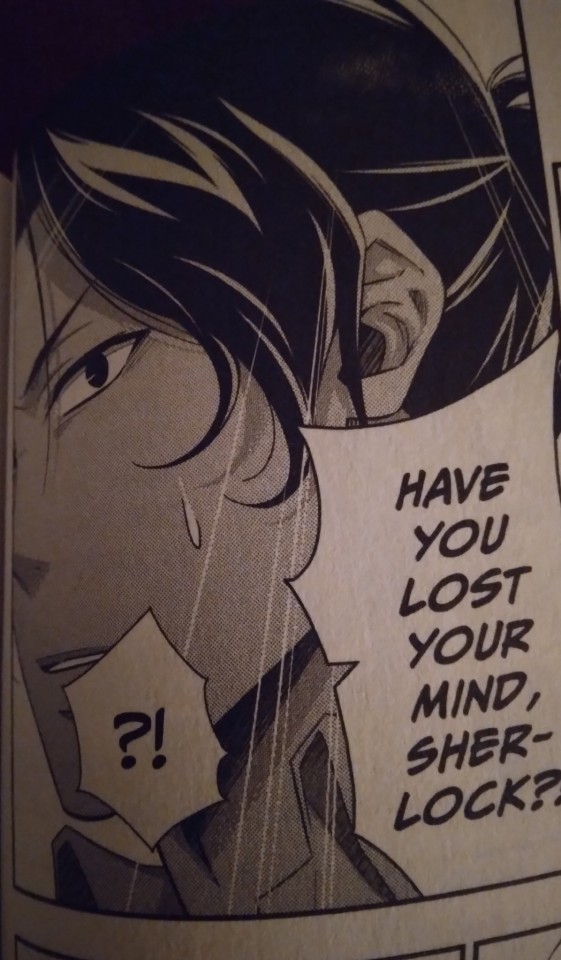
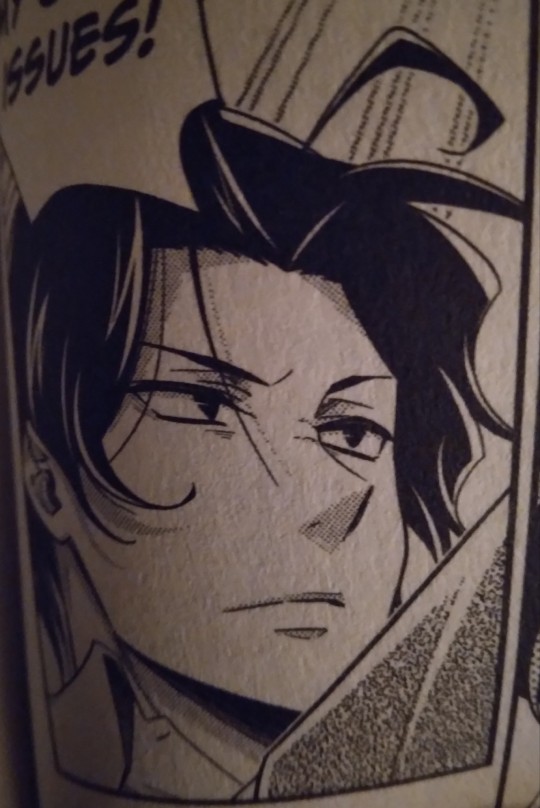
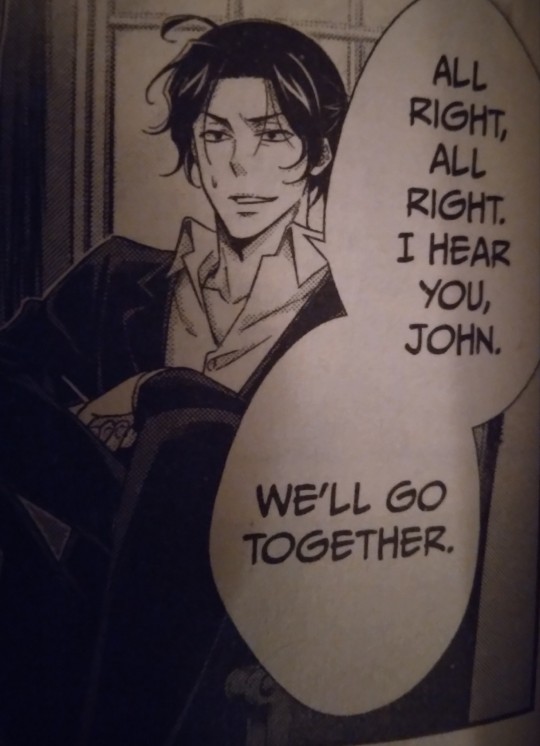
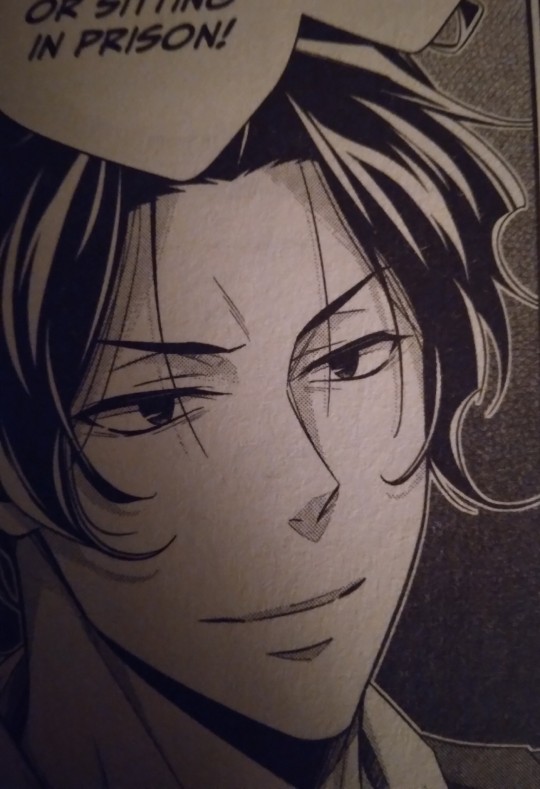
He relents...and eventually his face gets better.
And then I'm stuck trying to figure out the nuance in his facial expressions and I start getting lost.
He looks less grumpy but the line is back on his forehead here. What does that mean?
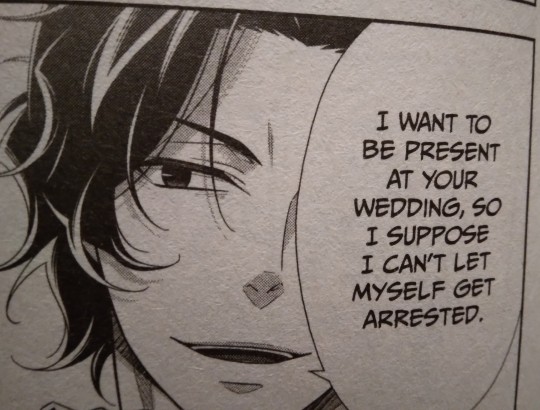
This is concerned and has the line so maybe concerned??
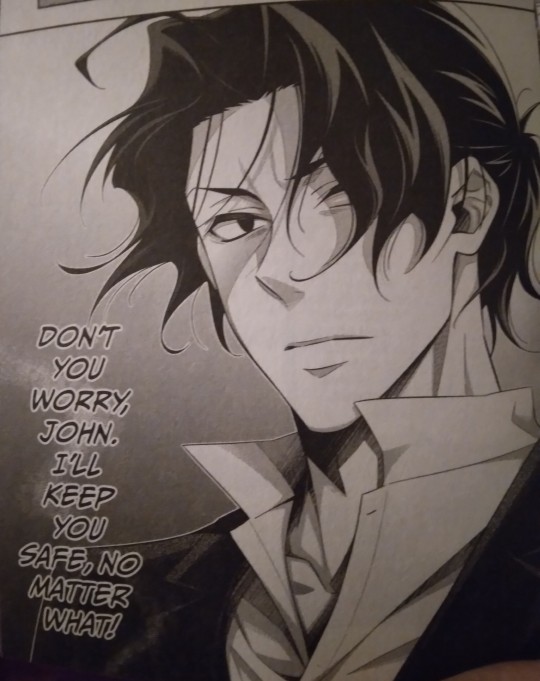
[Also that sentiment. Holy shit Sherlock.]
It's not the same as when he's being obviously sarcastic...
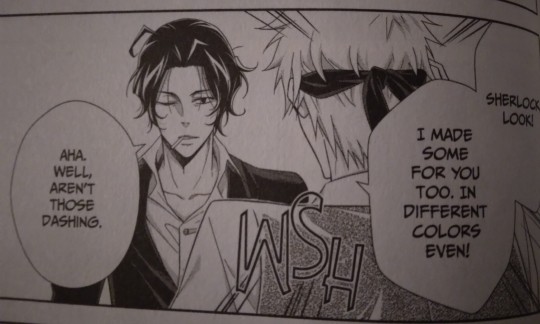
Like idk where I'm really going with this. I just...idk. There is something complicated going on between Sherlock and John this chapter and I'm trying to like. Find the words to describe it.
This all is the lens for the story of what Sherlock experiences that night. He's laying the groundwork for it...John repeatedly tries to make things go back to normal...but for Sherlock they are anything but.
You can kind of see that in the roof scene too, where John realizes that Sherlock is assuming John won't be involved in his mysteries anymore once he becomes a married man.
And there's this...parallel in Sherlock's language re:John to his language re:William being the Lord of Crime in the conversation on the roof:

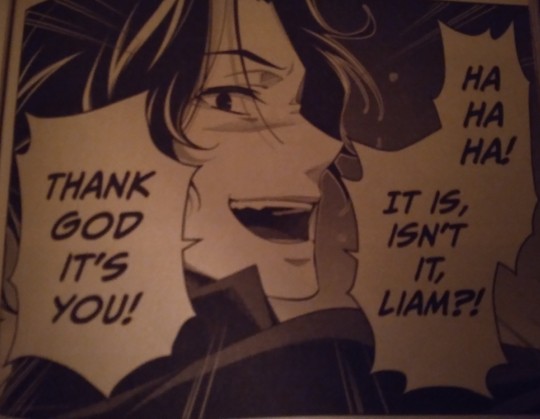
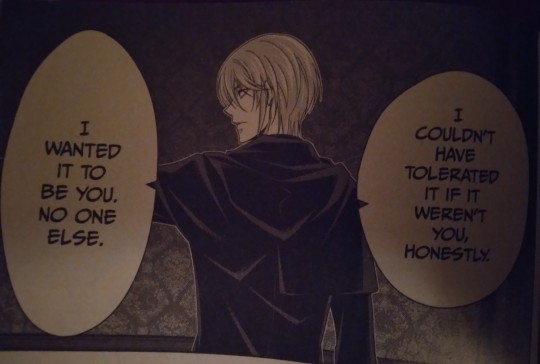
I guess I'm just having such a hard time reading Shelock this chapter. He obviously has decided that sacrificing himself for John (and maybe for Liam) is important. He sends John away, letting John assume what he must while also lying about his intentions when going into the house alone... he's certainly not fully answering John's question about the misread and what that means...
[Was he lying about his intentions in the first place? Before all this happened?? Was he always planning to eliminate Milverton?]
Sorry this is so disjointed.
Anyway. Regardless of his intentions...the result is that things are NOT going back to normal, just like he assumed during the conversation on the roof. He protected John from the situation. He is going to jail alone. John can get married without worrying about the evidence against Mary. John may want to go on more adventures...but he doesn't have to worry about doing so while being married because Sherlock has effectively cut him off.
Sherlock communicated his hurt. Communicated that 221b will feel empty without John. Communicated that he has no right to keep John from his life because he likes it better this way.
Like...I do buy "friendship" in this VIZ translation even if I have read Sherlock's feelings as shippy here previously...but it doesn't really matter because there's still this betrayal. And even if Sherlock recognizes the way be was treating Mary was a test to see if she was worthy of John...like there is still this reaction of his to pull back and be like "You don't need her for respect. I respect you, I always have." And like that reaction just breaks my heart a little.
Again. Super rambly, and I don't really have a point, just a lot of feelings.
#moriarty the patriot#moriarty the patriot spoilers#moriarty the patriot volume 12#moriarty the patriot volume 12 spoilers#john watson (ynm)#sherlock holmes (ynm)
22 notes
·
View notes
Text
T | 1206 | my hand slipped and it's not even shippy it's just some guy getting posessed by mold dont @ me ¯\_(ツ)_/¯ im falling behind and im too tired to write
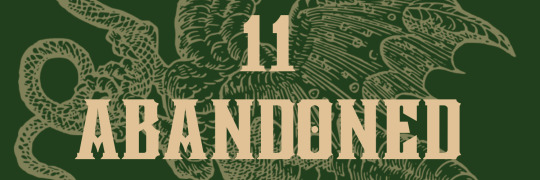
Jim was fascinated by abandoned buildings. For years, he has been turning his small hobby into a lifestyle, now slowly becoming his livelihood. Next on his list was an abandoned factory on the outskirts of a small Polish town.
He could explore them during the day, but the night gave them a certain thrill, becoming more than just forgotten and crumbling walls, sad in the daylight. During nighttime, they stood proudly, forgotten because they were too much, not because they weren't enough.
Besides, the night videos got better views.
He was alone this time, his cameraman puking his guts in their hotel room from an enchilada Jim told him looked suspicious. The bastard never listens. Going alone for some extra footage sounded better than watching him vomit anyway.
He scaled the fence and looked around for the best points of entrance. A cow painting, chipping away in the moonlight, smiled at him. The articles he found told him it used to be a dairy factory until the safety regulations changed and shut it down. The ex-workers were too old to track down and asking around town didn’t give him much more than the disappointing information that most of the equipment was sold to afford the last paychecks. So he didn’t expect much more than bare walls and some disturbing cow paintings.
The main entrance was secured with a heavy padlock, but he found a ground-level window big enough to slide through. The iron bars were old and came off easily with a crowbar and the window itself was barely holding to its frame anyway.
He appeared in what had to be the locker room. Whatever wasn’t worth taking didn’t make it out of the factory - benches with missing boards, lockers with broken doors, a pile of work uniforms.
He was glad to find the door to the hall outside unlocked, meaning most of the rooms might be open and ready for his prying eyes. Aside from two locker rooms, the underground level seemed to be holding two bathrooms and a mess hall. Knowing his audience’s love for the liminal spaces, he was happy to get some footage there, considering most of the tables and chairs were left as they were. Probably too old and not up to regulations enough to be reused. He took some wide shots of the abandoned space, once lived in, but now empty, forgotten without a second thought. Then he moved further, past the tables and the serving counter, into the deconstructed kitchen.
A lot of the equipment was still there, although barely recognizable in its new shape - stacked on top of each other in the middle of the room. Above it - a painting of a looming figure, like the ovens and pans and microwave were an altair in its honor. It seemed like good old fashioned vandalism, but he hadn't seen anything else disturbed, which would be unlikely if a group of people with spray paint broke in. Besides, he didn't see any of the entrances disturbed.
But upon closer inspection the paint turned out to be a stain of black mold, making Jim flinch away in disgust. He turned the camera towards it, a funny quip at the back of his tongue.
The stain was gone.
He lowered the camera, but the lens change didn't do anything, the stain was still missing. The wall didn't hold much more than the usual kitchen stains. He looked around as if the mold could have just moved to a different corner.
But something did move on the edge of his periphery. He whipped his head towards it yet found nothing. Just the shadows cast by the flashlight he was holding. The shadows, the black spots in the corner, that seemed to be breathing.
And then suddenly the darkness started gathering into one place. He took a step back.
The room got lighter when the shadows concentrated, layering on top of each other until they became tangible. The looming painting from before suddenly stood before him, with a body of shadows and mold. He stumbled back, running into a forgotten chair, bruising his shin.
He hurried to put it between himself and the shadowy being. He aimed the flashlight at it, hoping to disperse it into nothingness, but the light only gave it more shape.
“Hungry.”
Its voice stuck to Jim’s ears like a sticky residue on a kitchen table. He panicked, expecting to become a meal for a monster from a horror movie. Desperately, he rummaged through his pockets and found the chocolate bar he brought with him.
“Uh, you want a Snickers?”
The shadow mellowed. Jim couldn’t say what exactly changed in its appearance, but it felt appeased.
“Mars?”
“Sorry, I only have this, but I can get you one next time?” he offered.
The shadow nodded, somehow, and snatched the chocolate bar from his hand. Its touch was clammy and cold, sending a shiver across Jim’s body. He watched the chocolate crumble in its grasp, turning black and moldy before disintegrating into the creature’s body.
Could it do the same thing to him?
“More.”
He saw an opportunity and decided to take it.
“I’ll go now and bring you some more. Do you want a Mars bar? Maybe some peanuts? A burger? I’ll get you anything you want,” he offered, stepping back slowly.
“Stay,” the shadow asked instead, following him. Jim, inevitably, backed himself into a counter. It was sticky to the touch and so was the air around him.
“Hungry,” the shadow repeated.
“I’ll get you anything-”
A shadowy limb reached towards him. He craned his body away, but it was unrelenting and its clammy, disgusting fingers finally reached his face. He could feel it sticking to his cheeks and with a cold shock of horror, he realized there was mold spreading on his skin.
“No, wait-” He made the mistake of opening his mouth, letting the mold, sticky, and tasting of soil, enter his body. It coated him from the inside, until he couldn’t breathe anymore, until earth and sickly sweetness was all he could taste and smell. Soon his vision got coated with dark mist too, and he couldn’t move, his body covered in and out in the black mold. It crawled down the walls to blend with him into one. He blinked and blinked watching the mold move over his palms until his skin started showing again. The mold was crawling deeper and deeper inward, filling his organs until he looked completely normal outside, but felt full on the inside. Specks of mold littered the edges of his vision, and when he looked at his reflection in the window, he could see that his tongue was black.
Hungry, the mold said in his brain, the voice misplaced from his usual thoughts, coming from a different direction than he was used to. It roamed freely inside his body, nudging his legs to move, scavenge, and consume.
He walked outside the building, finally free, finally not alone. The moist inside kept him safe from the dry night air and the trip back wasn't long anyway. The faint smell of vomit guided him until he stood in front of his friend, pale in the face and sweaty. Deliciously weakened.
"Hungry."
#monsterlovetober2023#monster romance#horror#possession#urban exploration gone wrong#writing prompt#writeblr#human/monster romance#spooktober#original story
6 notes
·
View notes
Note
Yes i 100% agree with you on what you said about soukoku but now i MUST ask you to talk about odazai as well if you're up for it because i love them too. They are so important to me
Yes, absolutely! Sorry I didn't get to this sooner, it was past midnight last night and I've had classes all day. Odazai has become my OTP to end all OTPs, like it is unfathomable how much I love them. I could literally talk about them all day, so I'm sorry this got so long. I'm so happy you're a chill member of the fandom and love them too! By the way, I wanted to say I totally agree with your opinions on Kousano and respect your Chuuaku ones too! Kousano very much feels like a "these two are cool, put them together" kind of ship without a lot of concern for their development and similarities. While I do love Kouyou as a character, I don't have fond feelings for her when she's presented just by herself (as opposed to her other canon relationships like with Kyouka), and liking both parties of a ship is pretty much a requirement for me. Luckily, this happened with Odazai!
In general I do view this ship through a Dazai heavy lens because I relate to him hardcore and it's hard for me to understand/get attached to stoic characters like Oda. This is weird because I'm probably more like him irl than Dazai lol. I always feel like I'm not looking as deeply into Oda's character as I could be, and I try to be conscious of not lessening his role in comparison to Dazai's, but keep that in mind and judge me if you want as you read this lol.
What made you ship it?
The fact that Dazai showed the most emotion I've ever seen on his face and in his voice (amazing job by Miyano Mamoru) around Oda and the later realization that Dazai was Oda's first and one of his only friends. Not to say other characters *coughcoughchuuyacough* haven't made a significant impact on Dazai. I try not to compare these two ships a lot cause they are both meaningful in their own ways to the story and the characters. But anyway, I cried like a little bitch before Oda's big fight/death scene even happened, when Dazai just is begging him not to go throw away his life and trying to relate to him on a deeply personal level to get him to stay. That really showed to me how much he cared for Oda and how different that relationship was to him whether he knew it or not. Someone also edited the Dead Apple scene beautifully to be more shippy and I can never forget it. Also, Scarlet Sky playing every time Oda is talked about or Dark Era is referenced in the main storyline got me sobbing. I guess what truly made me ship Odazai is just the abundance of a suggested romantic connection (very obvious on Dazai's part). Dark Era (confronting Mori about this massive betrayal and leaving the mafia feels like "you have destroyed everything that was ever important to me, bye"), how Oda thinks of Dazai, not Ango or the orphans, when he believes he's dying after getting poisoned, Dazai literally ruining peoples' lives that he holds dear in the present just so Oda can live and be happy even without him in Beast, Dear Prince (a love song) playing when Dazai recalls that moment in Dead Apple and in the flashback later on, "Was it someone you loved?" and dodging the question LIKE HOW OBVIOUS can you get!!
2. As I fell further into the rabbit hole. . .
So I joined an Odazai discord server around a year ago, love it there, everyone's so creative and lovely, here if interested: https://discord.gg/tnA3mzyB. There's also a lot of analyses on Odazai on Tumblr that make sense! This post about Oda and Dazai being each other's regrets (from Dark Era light novel, Oda says, "Ango and I could stay by Dazai's side because we can understand the loneliness that revolves around Dazai. Even though we are by his side, we would never step within. But now, I'm a little regretful that I never stepped into that loneliness impolitely." Oda just say you wanna hold his hand lol), this whole post about them filling each other's unmet childhood needs, this which basically puts all Odazai moments and mentions together, I absolutely love this theory that there's a physical change in Dazai's ability after he meets Oda, there's just so much to love about them.
3. What I don't like:
Putting this here cause I don't want to end on this note. This ain't even about Oda and Dazai, it's just about the fandom. I don't think any of us who like this ship like the people who complain about the 5 year age difference. It's not a lot at all, especially when you take literally everything else about their relationship into account and the fact that it's fictional and fun. But since side A and B have come out (which I haven't read) I've seen people kind of using it as further evidence that the age gap is a problem and let it cloud their judgement on Oda and Dazai's respective personalities and boundary abiding tendencies. In addition to that I always see the, "but Oda calls him a child and views him like that in the novel" argument, which I don't really get. I watched some YouTube video a while ago that was like, why do partners call each other baby or babe? It's because those words represent a yearning to take care of the other and foster a better, more committed relationship or something like that. Saying your friend has a hurt expression like a lost kid doesn't necessarily mean you think of them as significantly younger or immature compared to you. This especially applies in fictional writing where it can just be used as a helpful visual for something that will be adapted to a screen. I don't have a problem with fans who dislike Odazai romantically, but I do when they completely deny their equal footing. Come on, Oda mixes up his fairytales and Dazai is insanely smart, their relationship would never be abusive on an age basis. Anyway.
4.. What are your favorite things about the ship?
Well for one, I'm a sucker for angst and pain and two, I love childhood friends/best friends to lovers so so so much. Add in the possibility of enemies to lovers in Beast and they have it all. I guess I like the ambiguity and flow of how their relationship could go too. Like, they both would think moving in with each other is totally natural friend behavior, and then there'll be this phase of realization and it'll just pass by like yeah, we're married now. From Dark Era, we get that Oda, Dazai, and Ango can all be friends outside their different ranking mafia positions because they all feel that they think similarly and understand each other. They're all on equal ground, so Dazai and Oda having a profound connection built off that is something I think can be an accurate reflection of real life. At their cores, both want the best for each other. Oda wants Dazai to have a life meaningful to him and suggests that path through what he knows, Dazai wants Oda to live out his dream, helping him to do that in whatever way possible. They are separated by time and space, yet so closely linked by what they've found with each other it hurts. There's literally already a family there with the kiddos too! These two seem to get dumber in each other's presence like SSKK also does and I find that amusing lol. I appreciate that Oda is serious about the people he cares about and doesn't take Dazai's suicide obsession as lightly as a lot of other characters, as some shippers speculate because he has also had depression at one point or another. I love that in several peoples' minds, Odazai would only have conflict when they're upset the other isn't taking care of themself properly. I love that Oda is such an oblivious himbo. I love that people speculate Dazai's bolo tie reminds him of Oda's eyes and that he picked the spot for the grave that overlooks a beautiful view even if he didn't know Oda loved the ocean. I love that they both realize they care about each other when it's too late, that they will meet in the afterlife.
I have many feelings and thoughts. Thank you so much if you listened to me rant and read this whole thing!
#okay but where the fuck did beast dazai get that picture of oda that's shown in the official art when he jumps off the building#asks#ships#bsd ships#bsd#odazai#and my dad doesn't understand why i want a tattoo#i don't know if i'll get something specifically odazai related in the future#but i definitely want a spider lilies design with “goodbye my love” in chinese or japanese kanji to remind me of them#dazai osamu#oda sakunosuke
52 notes
·
View notes
Note
it was worth my little pocket money, and I'm barely past the first half of the first book but I'm gonna go buy the second so I can chain them up without missing a beat. can I just say, I don't know what's gonna happen yet because I've somehow managed to avoid spoilers despite being in other mxtx circles, but the empathy sqq is having for the little "cannon fodder" character is waking up Big Su She Thoughts I've had for a while. not fan or shippy toughts, just. hard to explain in a short ask, but I feel like the "quota of evil" is poorly assigned in mdzs fandom spaces if you follow. anyway, I'm glad I bought the book, I'm loving the illustrations, amongst every thing else. ok, I'll leave you to your day now, I vote yes on the 3 pages essay and I hope you managed to get up and take your shower lol
Ahhh thank you!!!! 🥺🥺🥺❤️❤️ The essay will probably be delayed until tomorrow but I did take a shower !!! And I went outside !!!! 🐎🐎
IM GLAD YOURE ENJOYING IT!!! So exciting to go in blind ahh I'm so happy for you! Nicely enough though I think sv is one of those medias that you can get spoilers for and still fully enjoy because the Way scenes play out is just so indescribable.. the Shen Qingqiu narration will hit every time without fail
ALSO YES YES YES ABSOLUTELYYY!! I think svsss as a meta lens is SO interesting to analyze mdzs through because so much of the fandom and writing trope commentary carries over, especially how fandom sort of arbitrarily assigns "evil" to a character depending on how much they like them. I would love to hear your su she thoughts if you ever feel like talking about them!!! I think you'll have a lot of fun !! ❤️
24 notes
·
View notes
Note
I feel like me and the rest of the fandom are being gaslighted by Sessrinners and the existence of Yashahime itself when they keep on crying out that Sessrin was “obviously the intended canon from the start,” and “who else was going to be the mother?” And like…no? Before the existence of that dreaded Drama CD (which itself isn’t canon and just satire) there wasn’t a single hint or shippy subtext pointing toward Sessrin ever becoming a thing in the future. I legit went back and skimmed through all the episodes (even the Sunrise invented filler ones) and chapters the two appear in and no interaction between the two could even be taken as ambiguous, it’s all very strictly platonic. Rin didn’t even have so much a puppy love crush on Sesshomaru, she was excitedly shipping him with Kagura and yet shippers, Sunrise, Shiina and Rumiko wanna tell me she was an intended love interest all along and Sessrin antis were “just too blind to the truth?”
This is literal fandom gaslighting. The only possible hint that exists in the OG anime that I might give shippers is Takemaru in the 3rd movie comparing both Kagome and Rin to Izayoi, but 1: It’s not any actual shippy interaction coming from either Sesshomaru’s or Rin’s parts and only exists from the observations of an outside observer who mind you, is currently clearly losing his mind and 2: All the movies are non-canon, so just like the Drama CD they don’t count. (Though in retrospect realizing that Sumisawa directed all the movies like how he wrote the Drama CD and directed Yashahime it most likely was intended to come off as a “hint,” it’s definitely not an obvious one that normal non-pedos who don’t have lolicon brain rot would ever pick up on, I know I didn’t my first time around and was frankly shocked during Yashahime’s initial announcement that Rin was actually being considered a serious candidate for the twins mother)
So let me get this straight, all the shipping “hints” that even exist for Sessrin are all from non-canon material? Not the actual original manga or show itself? And Sessrinners still wanna insecurely scream at the top of their lungs on how “Sessrin is canon” and the fandom has to be forced to accept it? No, fuck that! I know gaslighting when I see it!
I agree wholeheartedly - through Yashahime, we're told by Sunrise and affiliates that the only valid interpretation of the relationship between Sesshoumaru and Rin is a romantic one. We're told that it was inevitable that they should get together, that there was no other option for the two of them, and that this is a GOOD development instead of a regression. If we point out that a romance between the two was unsupported in the source material, and that the interpretations we took from it were much more platonic, we're gleefully dogpiled by shippers who insist that WE'RE the ones who were drawing those platonic interpretations from nowhere. Pointing to specific scenes and interactions that indicate Rin is not Sesshoumaru's equal, that she obeys him like the child she is, that Sesshoumaru plays the role of a surrogate father, are points that are dismissed without counterevidence and a handwave, if not ignored altogether. There is no reason to believe that these two characters aren't meant to be a couple someday, you're just looking at this through the lens of WESTERN morality, and antis are committed to an insane moral standard.
What are you talking about? I don't see a gaslight. You're just crazy.
Honestly, at this point, it's a wonder that we bother to back up our opinion of the matter at all anymore. Obviously actual evidence from the manga doesn't matter. It doesn't matter what you can SHOW actually happened in the story and how your interpretation can be drawn reasonably from the text. All that matters is whether a writer at Sunrise with a VERY clear bias toward depicting these types of grooming relationships managed to get HIS interpretation widely distributed or not. Because if you're part of the official entity that officially OWNS the IP, your opinion matters more, I guess.
RT shrugging and yielding to Sunrise's version of the relationship certainly doesn't help matters. Though she HAS (at last) come out and said that she personally viewed Sesshoumaru as a parental figure to Rin, I don't think that she ever cared one way or the other whether people shipped them. I speculated a while back that the reason we never got her stance on the matter sooner was because she didn't want to alienate ANY of her Sesshoumaru fans, because him being one of her more popular characters meant that her voicing an opinion on his relationship with Rin might mean some people would stop reading/watching Inuyasha altogether and it would hurt her bottom line. I'm more convinced than ever that this is the case, because she out-and-out AVOIDED questions about Sesshoumaru getting together with Rin when she's older up until after the first season of Yashahime, which she would only do because she wasn't going to make them a couple, but she knew that her friends at Sunrise might want to take a crack at it at some point and she didn't want to close that door. She only went ahead and finally gave her own perspective when it was clear the show was a major flop after the mother reveal, and there was nothing left to lose by trying to recapture some of her lost Sesshoumaru fans by showing them a little solidarity.
Not sure how successful a move that was, given I know a LOT of folks who are still very upset and not buying anything Inuyasha branded anymore. I guess the only ones who will really know for sure are RT and Sunrise, as reflected in their plunging profits.
70 notes
·
View notes
Note
I shouldn't be surprised by the way fandom latched in hob/dream, if I turn my head to the side a little I get the appeal, but it's still annoying when you want to check out other characters, the women mostly. I want more stuff about Lucienne and Death and Lyta and there's almost nothing bc everyone is fanning over dream/hob shippy fics, and I sorry but Hob specially is a very one note character. He's not even in the main plot
Yeah it’s weird bc I’m not too surprised Dream x Hob is the biggest takeaway, but I’m also like??? They had half an episode together, and he’s in three issues overall in the comics? So the over-emphasis on their friendship and relationship is just….really bothersome to me. Sandman is one of my favorites bc you can approach it entirely without a shipping lens, so I sometimes feel a little wary that we took a massive fantasy story and the biggest fan reaction is “hehe boyfriends”. Not to mention in the comics and the show the women from Rose to Lyta to Death play such an important part and yet…they really only get some gif sets.
18 notes
·
View notes
Note
There’s been two things that really bother me in this series with BKDK, they bother me because I don’t know how to really explain them without being shippy. The “damned nerd” narration and the fact that Izuku, despite hardly having any reason to do so, continued to lie to All Might about why Black Whip really unlocked. He really didn’t need to because I mean like it’s understandable with Bakugo, Deku probably wanted to just spare his feelings especially since what Monoma said is something that Bakugo was really sensitive about, Deku however chose to lie to All Might when he could’ve just gone up to him later and told him the truth if “sparing Bakugo’s feelings” was really all it was. The “damned narration” REALLY bothers me because I literally have no good reason for why Bakugo would be narrating in a situation that had absolutely nothing to do with him. It could’ve have easily been Ochako, I mean that would make logical sense wouldn’t it? So why isn’t she the one narrating?
Idk maybe I’m being stupid or something, I really ship bkdk and I really don’t think it’ll be canon but, there are some things I just don’t have a good explanation for that wouldn’t involve shipping.
The thing is every time someone jumps in to say “Deku is straight!” it’s usually way out of context with whatever the OP was saying/drawing, which tells you even they see Izuku and Katsuki through a shippy lens, just in a negative way, because they’re afraid of it. I cannot stress enough how telling that is, both for their absurdity and for our solid reasoning. We are not delusional.
29 notes
·
View notes
Note
Rec list for Eddie and Symby being vaguely to very gay?
I'm sorry for coming to you with my monsterfucker agenda 😔👊 (no I'm not)
i mean, i probably could’ve seen this coming.
venom is dominated by two opposing narratives. let’s call this the “relationship narrative” and the “control narrative”. they’re not perfectly separated, like, you’ll definitely get elements of one in the other, but generally one of them describes what the story, at its core, is using the symbiote for.
now comics are an endless tug-of-war at the best of times, much less the gayest and slimiest of times. there’s a neverending backlash and backbacklash going on between these two takes. what you want is the relationship narrative.
everything very much started out with that take. eddie and the symbiote are two characters who forge an evil alliance because it lets them do what they wanna do (kill spider-man, more or less) and they have the same kinds of neuroses and complexes and syndromes. lots of early comics are also very fun about the merged consciousness, merged identity deal. that’s kind of the textbook relationship stuff.
personally i absolutely think the original stories (venom was created by david michelinie) have romantic undertones, even starting in the villainy days. eddie describes their first meeting as “a shadow moved, caressed me.” he takes the rejection of the symbiote still being “in love with” spider-man really hard. he sobs his eyes out when he thinks it’s dead and promises to avenge it bare-handed. they totally expect to live happily ever after on a deserted island together.
then there’s venom: lethal protector, which is cute on its own, but if you’re reading for slime romance, i very specifically recommend the novelisation. i won’t even spoil it. and then, planet of the symbiotes is the first comic that i would say has outright queer themes, intentional or not.

so all those recs until now are collected in this post.
we're trucking along through the 90s, we explore elements of one take and then the other and sometimes we ignore the symbiote completely, but not too much changes, overall. the next BIG stop in Gay Venom is, of course, the hunger.
miniseries by len kaminski, just venom: the hunger. plenty of people have written their essays on it, but what’s always important to me is that it DID NOT come out of nowhere. as said above, it expanded on themes that were there, it references michelinie venom very explicitly, like you get your SECOND “tenderly touching the green glass tube” scene.
but yes this one is specifically about, like, stigmatisation, otherness, mental illness, meeting all those things with care and empathy and optimism, tentacle sex. again, many essays. a venom comic that can go “look at the twisted deviance of this relationship” and then turn it around into “but how are you looking at it” is good. god how good would it be if they also did that to eddie more. anyway.
a few years later you get the first MAJOR fucking backlash, culminating in the SECOND story titled the hunger. spectacular spider-man: the hunger, from 2003. completely reboots venom and retcons their motivations and backstories, makes very spiteful references to planet of the symbiotes and the hunger, like it is not also called that by sheer coincidence. literally starts out, in a comic that wants to tackle and redefine venom, with the line “the PROBLEM is that you guys are like an old married couple”. so the new status quo is that the symbiote only ever used eddie to be with spider-man, and eddie only ever used the symbiote to not die of cancer.
the “control narrative” that really kicks in here uses the symbiote as, you know, a thing to control, eddie’s demons personified or even a completely foreign force to torment him. if eddie is evil, it’s not because of what he thinks and believes and wants, it’s because he couldn’t control the symbiote and gave in to its inexplicable bloodlust.
this is an unambiguous downgrade in terms of complexity, in my humble opinion, completely fucks up eddie’s responsibility themes, and is also a pretty clearly petty reaction to venom’s absolute oversaturation in the nineties. the bitch was everywhere and most of it wasn’t good. so there was LOTS of “look at this creepy loser” content by writers cringing themselves into self-awareness at the time. the 00s were going to be GRITTY and MATURE.
this of course means that we get to see eddie slit his wrists and bleed to death on panel after selling the symbiote to supervillains as an attempted act of redemption???
wild fucking times! it’s not exactly worth recommending as ~shippy~, but the first real backbacklash to this first round of retcons comes from dan slott, who just kind of ignores it all in new ways to die. drags eddie back to the land of the living and relevant, makes the symbiote refuse to let its new host kill him, telling that host, and reestablishing, that it loves eddie. and then, to keep him living and relevant, slott makes eddie anti-venom.
don’t even worry about it. anti-venom is essentially eddie seeking redemption with symbiote powers, but without the symbiote, except he pretty much acts no fucking different at all, just keeps on being a murderous vigilante with cracked ideas about innocence and guilt. people still act like he’s better now because, in its metatextual ways, the hunger was right.
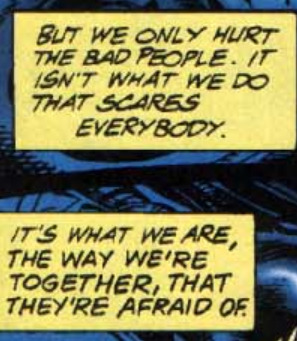
then fucking uuuuuuhhhhhhh. agent venom. symbiote goes to flash thompson and the us military, and the writer, rick remender, goes really, really, really hard on the control narrative. the symbiote becomes a substance flash is addicted to, gives a voice to his past abuse, it’s dark times all the times.
people very much do like that narrative for flash, like at least from that perspective it was worth it. i don’t like it much for the symbiote. for the symbiote, representing everything fucked up with flash and forcing him to murder kill bite all the time is resolved via the good guy avengers literally lobotomising it so flash can wear it without further resistance or input. imagine doing that to a human person. you’re uncooperative so we’re gonna turn off your higher cognitive functions and wear you like a meat suit. happy ending for everybody! truly we’ve conquered our demons this day.
then! at the same time, there’s a cartoon coming out, it’s called ultimate spider-man. THAT one does the control narrative take with harry osborn, but then does the relationship take with flash, making it the only cartoon to outright redeem the symbiote and let it find friendship and be valued as a person.
and people loved it! so brian michael bendis gets it in his head that he’s going to redeem the symbiote and make it partner up with flash. and he does redeem it by the highly fucking questionable means of having it be “cleansed”, aka brainwashed and relieved of its memories and personality. not that it matters for long. nothing fucking matters in comics. take this with you if it’s the only thing.
so then for fun friendship times you get venom: space knight, flash and the symbiote’s adventures in space! and then that gets cancelled. eddie is off somewhere being toxin and hunting carnage (2016). many good comics but you did not ask for them.
and THEN.
it is time for the next MOTHER of backlashes.
flash gets literally discarded at fucking roadside to put the symbiote back on eddie and turn back time on their relationship to RIGHT before the FIRST backlash happened. you know, all those 2003 retcons. gone. ignored. no more. venom’s themes are now those circa 1996 again. full fucking on relationship narrative. ROMANTIC relationship narrative, and that after the symbiote was turned into eddie’s evil shadow, after he hated it and spent a LONG time seeking to eradicate all symbiotes (and not even for the first time).
the COSTA run. venom (2016). reviled and beloved.
like this comic is fucking ANGRY about symbiote treatment. i HAD to tell you all of that so you’d understand ANYTHING it’s doing. the first thing it does is flip it completely around, puts the symbiote on a military guy who’s making IT do bad things, makes his ability to control it horrifying and abusive instead of heroic and admirable. one of the later things it does (in the follow-up venom: first host) is outright feature a villain who lobotomises symbiotes, ending on a symbiote serving him swift and sweet payback by doing the same thing TO HIM. it’s exactly as unsubtle as the hunger (2003) was about its hang-ups.
comics... are a conversation.
flash remains a symbiote friend but still got fucked over big time by it all, symbiote-focused writers slott and costa also kind of use him to literally, in case anybody hadn’t caught on, literally spell out the REAL story that’s been going on in the writer's room for the past THIRTY YEARS:
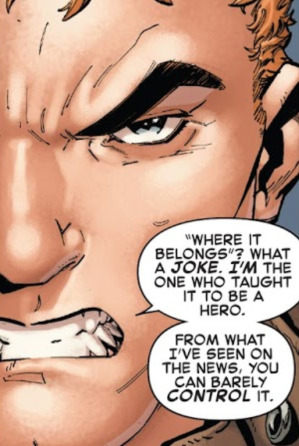
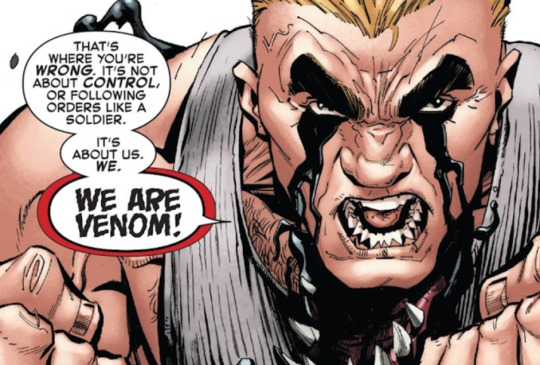
you’ll notice i didn’t actually list any of the Gay Shit for you, you’ve probably already seen it or you’ll get to see it for yourself. yes, they are deeply in love, yes, it’s fucked up and flawed, yes, it is real and taken seriously and has ultimately redeeming potential. yes the concept of that nearly knocked me off my feet and in front of the subway at one point. yes there’s mpreg
it’s also fucking riddled with events, which spin off into other comics, so either ignore those and rely on the recaps OR click yourself forward through the “next issue (story)” button on marvel wikia to know what to read.
and after that must of course come the backbackbacklash, as certain as death or taxes. in the next run, we retcon everything once more, eddie just needs to control his darkness, the symbiote was an evil abuser all along, nothing on earth is ever new.
i’m not gonna go through it, i’m just gonna point you to the backbackbackbacklash issue that came out during this time: venom annual volume 2 number 1 - it’s confusingly named, it’s the one that has a blue-skinned space lady on it. this one ignores the backbackbacklash going on very pointedly and goes “it’s not ABOUT control” again, it’s pretty explicitly romantic.
and then there’s also marvel comics presents (2019) #5, which, oddly enough, does not particularly feature the characterisation you’d typically see in the relationship narrative? but it does feature eddie and the symbiote literally fucking, so you’d want to know about it.
that’s the overall, like, frame of eddie and the symbiote being in a relationship (nuh uh) (yeah they are) (NUH UH) (YEAH THEY ARE)
some stuff that’s smaller but still notable, uh.
nova (1999) 6 - 7, that’s the “we’re space married”
venom: dark origin, that’s an ALTERNATE (!!!) take on the character, don’t expect a likeable eddie but it’s very darkly funny and gay so what can i say.
venom: the end, which i would absolutely fucking hate to be canon, i think its characterisation is quite regressive, but the symbiote sure is in love, i guess.
venom: separation anxiety, the dawn of the control narrative but eddie’s characterisation did not have to go so wrong from here, like if they’d just figured out AT THIS STAGE that he's STILL acting like venom without it... i digress. it has the symbiote going eddie eddie eddieee
venom: sinner takes all, this is the first she-venom comic so that’s. hm. interesting. healing symbiote blanket
don’t read venom: license to kill just look at this panel with me
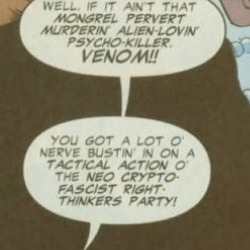
if i think of more comics worth adding i’ll add them.
the subtext slash text is heavy enough to be present to some degree in literally every cartoon adaptation of eddie brock. spider-man: the animated series goes FULL control narrative, in fact it started the “the symbiote corrupted peter” take that we to this day cannot escape, but the first few venom episodes are VERY playful about their relationship.
in spectacular spider-man it’s canon, but horrible. eddie’s in love with it, but eddie's a good boy and the symbiote is played very, very, very abusively. i think this is an evil symbiote adaptation that works well enough, at least it’s an actual meaningful character instead of just a malevolent force to resist.
in marvel’s spider-man, the only venom episode worth watching is venom returns.
i’ve actually got every symbiote-relevant episode listed right here from when we did our communal watch-through.
also watch truth in journalism. idk if it’s exactly shippy just do it
204 notes
·
View notes
Text
CQL Rewatch - Ep 23
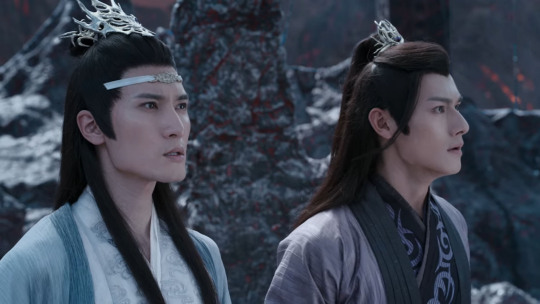
Seriously, how useless are these two right now? The puppets all dropped dead around them, yet none of them run up to help Wei Wuxian. I think we saw Lan Wangji running, but he just had dramatic close-up shots for the first few minutes as well. Like, stop looking dumbfounded and stop just providing facial reactions to things, and get up there! Act like you're in a war, gdi! They're reacting to seeing Wen Ruohan stabbed, which I chose not to cap for obvious reasons.
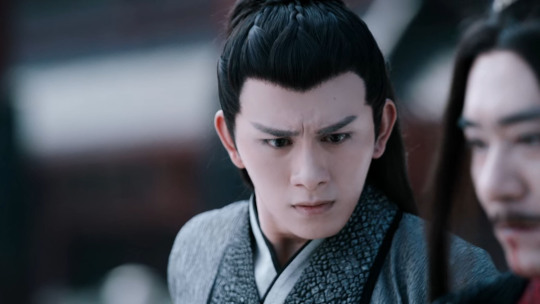
So even though I knew the story from the book, I still think this moment is pretty cool when they reveal that it's Jin Guangyao who has stabbed Wen Ruohan literally and figuratively in the back. The last time we saw him, poor Nie Mingjue was getting the crap beat out of him by Jin Guangyao, so seeing this here--like, ooh! Double-double-cross! Triple-cross!! It's fun to see a twist that doesn't make you groan! Because, of course, you want to root for Jin Guangyao because he's a bastard and has always been looked down on everyone. Now you see that he was not a villain at all, and he was actually helping the good guys by double-crossing Wen Ruohan! Of course, we know he really is a villain and all, but most of that really doesn't come until later in the story haha.
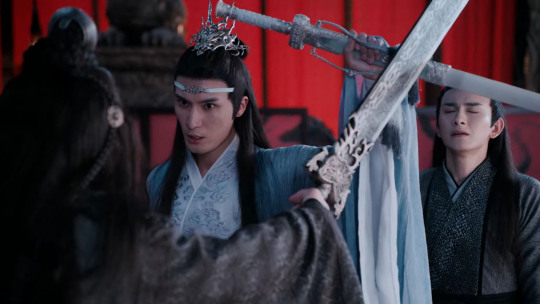
I do enjoy the light parallels here between Lan Xichen and his brother. We see both of them willing to give their best friends the benefit of the doubt and protect them from those who are less willing, let's say. And both of them are even willing to stand up to other people they know and trust. Nie Mingjue is one of Lan Xichen's closest friends, and we see Lan Wangji stand up to his own uncle. If you're looking at CQL without the romance angle (which, why would you?), this parallel is a bit more striking. You basically have two sets of bosom friends. Obviously one set crumbles at the end, but there are definitely a lot of parallels and comparisons to make. And sorry, for a show that couldn't have any gay characters, they sure made it seem like Lan Xichen and Jin Guangyao had a thing for each other (even though neither of them is gay in the book, mind you). A weird sort of change--I don't even ship them, but their early scenes seemed very shippy. Maybe it's my American lens, I don't know.
But speaking of weird changes, allow me to go on a tangent. Wen Qing's role expansion doesn't bother me, not really. I kind of say it does, but it's not really the expansion that gets to me. It's the fact that she was going to be a love interest for Wei Wuxian that bothers me. Wei Wuxian is gay. He's gay. Lan Wangji is also gay--if not gayer. Her being a love interest for either one of them means they are no longer gay. Bi, maybe, but what that would have done was erase their canon sexuality. It would have also turned their relationship into that horribly tropey brothers-in-arms or whatever name you want to give it--basically JUST FRIENDS who want to defend each other's honor. You can certainly read CQL that way, but if you are, I don't think you're paying attention to Wang Yibo's performance at all. And if you're not paying attention to the second lead, then why are you watching this show at all? So, changing their sexuality changes the whole show (which already is so tropey, from what I understand) into something so derivative, I wouldn't even want to bother watching it. One of the things I think you take away from CQL is Lan Wangji's, frankly, undying love for Wei Wuxian. If he goes and has a fling with Wen Qing at any point, that cheapens his character dramatically in my opinion. Lots of people can say this better than me, and probably have, but I'm very grateful to those passionate fans (and to Xiao Zhan and Wang Yibo) for helping to change the script from the original drafts, which were frankly no better than a junky harlequin romance, having Wen Qing passed around like a piece of meat, which is so far from her character in the novel, and definitely a disservice to her.
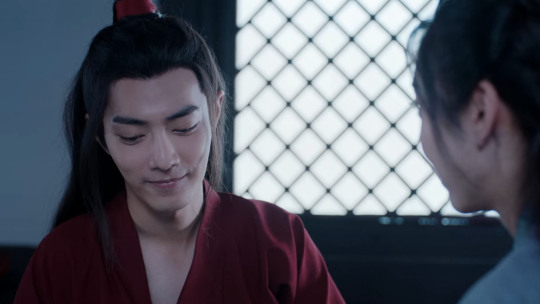
Not gonna lie, it's adorable to think that Jiang Yanli and Lan Wangji have been talking over the past few days, maybe having tea together, while Wei Wuxian is in a coma. I feel Lan Wangji was a very calming presence for Jiang Yanli, because she was probably very worried and fretful over Wei Wuxian. I like the idea of him playing the guqin for Wei Wuxian, and then having tea and a quiet chat with Jiang Yanli before leaving. Also very cute that Wei Wuxian is half-heartedly trying to badmouth Lan Wangji, by calling him boring and uninteresting, but he can't even get through the sentence without smiling to himself. Obviously he's loving the idea that Lan Wangji has been at his side every day, worrying over him and slowly doing his part to nurse him back to health.
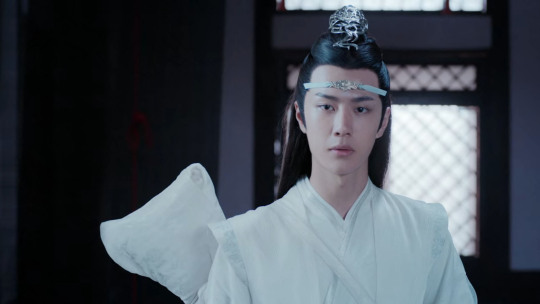
I love his expression here: shock and relief and joy, all mixed together upon seeing that Wei Wuxian has woken up. Obviously he knew he'd wake up eventually, but he didn't expect it so soon and I don't think he expected his heart to be in his throat and to be so indescribably happy to see Wei Wuxian awake.
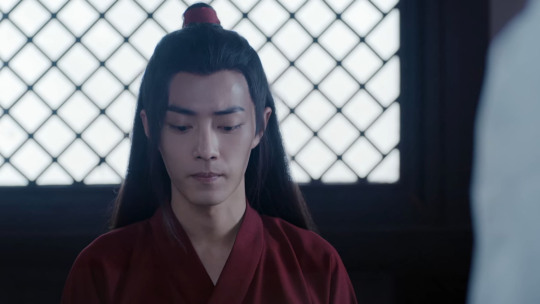
Wei Wuxian, of course, can't really meet his eyes, and Jiang Yanli makes a swift exit (she knows what's up--these boys need to talk). And Lan Wangji just has love in his eyes: Heart-guang Jun. I mean, imagine how he must be feeling right now. He had just gotten Wei Wuxian back from what seemed like certain death, finally reconciled, and then Wei Wuxian is in a coma! He must have been terrified of losing him again. It's probably all he can do right now to not hug Wei Wuxian.
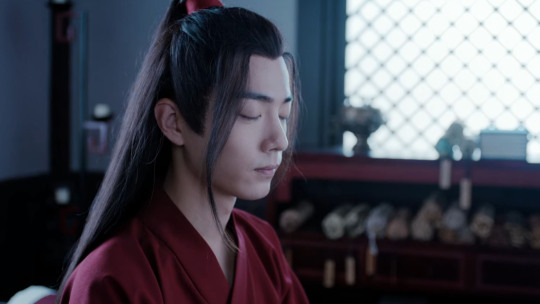
I seriously love everything about this scene. I love the colors, the cinematography, the longing glances Wei Wuxian gives Lan Wangji, the way Lan Wangji quietly scolds him while still playing the guqin because he's a professional. But really, I just find this scene very pretty and moving and emotional. I enjoy seeing Lan Wangji getting to take care of him and even more that Wei Wuxian lets him and puts up with it. I think most of us are quick to retort a good old, "I'm fine" when asked how we are, but in this case, Wei Wuxian is not fine, and he has no ground to stand on if he's trying to prove that. It's hard for Wei Wuxian at this point, though, to really lean on anyone, even Lan Wangji who is his best friend. He certainly can't lean on Jiang Cheng for reasons I don't think I need to go into again. He kind of leans on Yanli, but at the same time, he can't (and doesn't wish to) burdon her either. Lan Wangji is really the one person he should be able to lean on and seek comfort from, but he feels awkward and uncomfortable, because of the dark spiritual energy and giving up the sword, and Lan Wangji's crusade to help him.
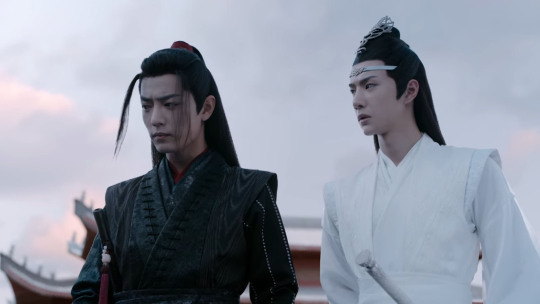
"Who is good and who is evil?" Wei Wuxian is struggling with a moral dilemma: is it right to round up the Wens and kill them/hold them captive? The Wens did horrible things, after all, and this is the reality of war. Of course, we've just seen Lan Xichen struggling with it as well. Why capture the women and children and elderly, who have nothing to do with the war? He's only met with the fact that it's not just the male cultivators who are dangerous. Still, his mind is only placated by the lie that the people will just be interrogated and sent to a labor camp--then cut to the blood on the floor. So Wei Wuxian is not only struggling with what the Jin Clan and other clans are doing, but he's also thinking about his own deeds--how many people did he kill? How many did he brutally murder in the name of revenge? Because of the things he's done, is he good or evil? Is good and evil so black and white? Does it just depend on whose lens you're viewing it through?
Lan Wangji looks at Wei Wuxian with all of this knowledge and doesn't know what to think. He's afraid of what Wei Wuxian has become, afraid he'll end up like Wen Ruohan--he's afraid of losing him entirely. But the situation is not black and white, and good and evil is not so easily defined. You can only know once you know that person's heart, and Wei Wuxian isn't really letting Lan Wangji in anymore. He's trying to convince him with his words, but that is simply not good enough.
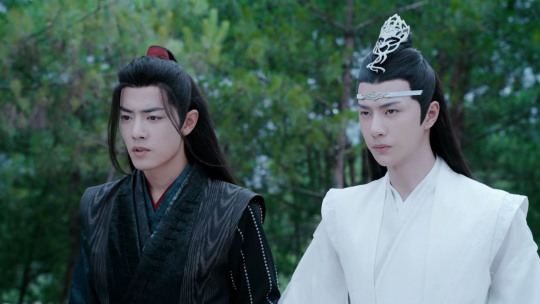
I think if Lan Wangji hadn't stopped him here, Wei Wuxian would have played that flute and tried to end all of the Jin "hunting party" (sorry, that was a little dark). His emotions were already high after the conversation with Lan Wangji on the cliff, and we've already seen him feeling disturbed by how the Wens are being chased and rounded up. I, for one, wouldn't have complained if Jin Zixuan's cousin bit the dust earlier. I think his name is Jin Zixun. Is that it? See, even I don't remember him.
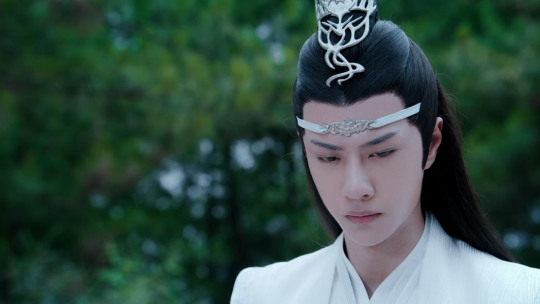
I love how even though they are far apart, this scene still feels very intimate. It's very moving, and the music and the cinematography help to cultivate that feeling. I like how Wei Wuxian perks up when he hears Lan Wangji pluck the first few notes, and Lan Wangji does the same when he hears the sound of Wei Wuxian's flute. I feel like they are spiritually connected here as they play this haunting duet. And I think it's a connection they haven't felt for a long time. There has been so much tension between them for so long, and this scene feels like a big sigh from both of them. While I still feel like there is tension present, there is a bit of a release here--at least, that's how I feel as a viewer.

Ah, yes, the awkward period where Jiang Cheng has become leader of the Yunmeng Jiang Sect, wants to control Wei Wuxian, but doesn't know how. He's new at this, so I can't blame him for being a bit awkward as he figures out what he's supposed to be doing. As a young man, he basically nagged Wei Wuxian for doing inappropriate things, but now when Wei Wuxian misbehaves, Jiang Cheng is in part responsible for that behavior. At some point or another, the two of them grew up. Wei Wuxian's misbehavior isn't precocious anymore--it's serious and it has consequences, and just as in Gusu, Jiang Cheng sees that those actions are a reflection of the Jiang Clan. Only now, they aren't just a reflection of the clan, they're also a reflection of Jiang Cheng, himself, and his leadership (or lack thereof).
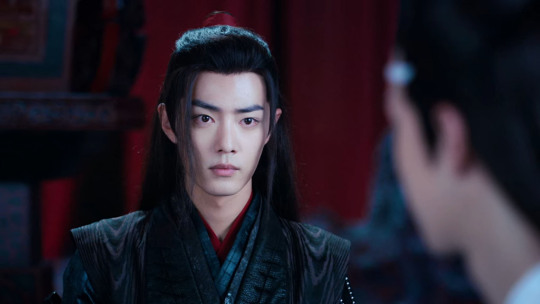
And speaking of awkward...Wei Wuxian and Lan Wangji have some...unresolved...stuff to deal with. But God forbid they actually talk right now. How can they? They're at this stuffy banquet that neither one of them want to be at. I feel for them both. Wei Wuxian is hurt because he thinks Lan Wangji doesn't trust him. Lan Wangji feels terrible because he wants to help Wei Wuxian, but the latter won't really let him in and allow him to do so. I feel myself just on pins and needles during these scenes with all these glances, but at the same time, I love it because DRAMA and ANGST! And they're just so in love lolol.
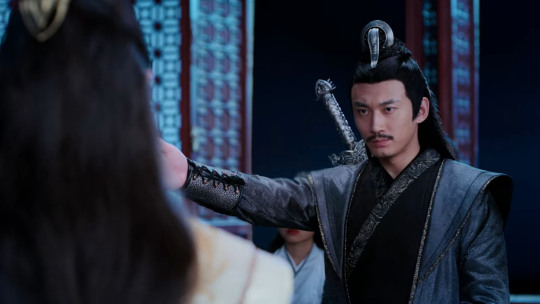
Nie Mingjue has to be that guy that always wants a certain table. The waiter leads him over and says, "Is this table okay?" expecting the answer to be yes, but nope--not Nie Mingjue. He'll request a different table. XD
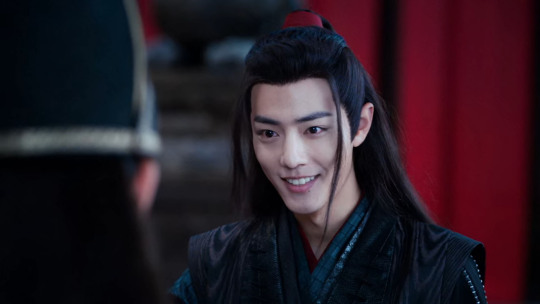
I love this little conversation--it's like they're both measuring each other up. I think they each have a healthy distrust of the other. Although Wei Wuxian has always been kind to Jin Guangyao, I don't think that discounts the whole demonic cultivation thing in his mind. He knows Wei Wuxian is smart and clever and, most importantly, capable. And as for Wei Wuxian, I don't think the ease in which Jin Guangyao manipulated Wen Ruohan is lost on him.Essentially the downfall of this great cultivator and enemy of all the other clans was due to one man: Jin Guangyao. I think Wei Wuxian is thinking the same thing I am: he's extremely clever, devious, and potentially dangerous if you get on his bad side. His rise to power within the Jin Clan is kind of amazing. His estranged father admits to Nie Mingjue and Lan Xichen that Jin Guangyao is his son, his station has improved drastically in a short amount of time. He sure as hell is dangerous.
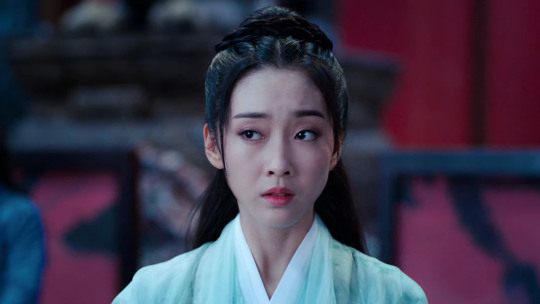
Jiang Yanli can hardly contain her excitement when Jin Guangshan brings up her former engagement to his son. Just kidding, of course. I'm kind of horrified for her that he's bringing this up now in front of all these people. It feels very much like he's pressuring not only her, but also his son to get engaged again. First of all, Jiang Fengmian and Jin Guangshan agreed at the time to let the children decide whether they wanted to get married or not. Second, if you're going to talk about this, at least do it in private! Third, this is not letting the kids decide. God, this would be humiliating! And I also totally expected Jiang Cheng to speak for his sister here, so I'm glad he didn't do that. It's really none of his business either.
Lol! The weird cutoff here! Who's speaking??? I don't know!!! I mean, obviously, it's Wei Wuxian, but it's like they don't expect us to recognize his voice hahahahaha.
Other episodes: 1 | 2 | 3 | 4 | 5 | 6 | 7 | 8 | 9 | 10 | 11 | 12 | 13 | 14 | 15 | 16 | 17 | 18 | 19 | 20 | 21 | 22 | Or just check out the #CQL Rewatch hashtag
#wangxian#wei wuxian#lan wangji#theuntameddaily#cql#the untamed#jiang cheng#jiang yanli#wen qing#jin guangyao#lan xichen#ep 23#cql rewatch
19 notes
·
View notes
Note
What are your favorite chinese webnovels? What are some of the differences youve noticed between cnovels and other types of novels?
That second question is really, REALLY interesting, and I really want to answer it well, and I am REALLY sure I’m going to do a bad job of answering it, so let me just noodle about that first question for a minute while I try to think XD
I went through some of my TOP-top favorite novels in more detail yesterday, but generally speaking, mxtx and meatbun are both at the top of the pack. They’re really good at writing compelling main characters and balancing piles of angst with plenty of humor and pulling everything together into a very satisfying ending (which is something I don’t alwaysssss see, even in some of the novels I really like). After them, The Disabled Tyrant’s Pet Palm Fish (transmigration, ancient chinese prince falls in love with pet fish) and Golden Stage (ancient chinese gay arranged marriage between bitter enemies(?)) are two novels that I love a lot, which both have very cute romances and go a bit lighter on the main character suffering front, and which I broadly recommend to anyone who’s interested in the genre. They didn’t end stick the landing QUITE as hard as an svsss or tgcf, but they still were very nice.
Then, let me see. I’m trying to remember which books I’ve read in the last year, and am doing a terrible job, haha. I will say that a book I enjoyed for like... eighty percent of it and then the ending let me down terribly was The Dreamer In The Spring Boudoir (modern day career woman transmigrates into barely-fantasy ancient china novel as the disliked primary wife of a nobleman), which is also the only straight webnovel I’ve read so far. The main character and romance were delightful, but that ending... haha, wow, I felt betrayed. But I did like the first half very much!! I’m idly contemplating a deliberately-partial reread. Then I’m currently like two chapters away from catching up with the current translation of The Wife Is First (ancient chinese prince lives out time travel fixit fic, determined to treat his spouse better this time around). I’m also catching up on Heroic Death System (transmigration, across MANY universes, where the goal is to die heroically in each one, and also maybeeeee to find his boyfriend in each one. this shit gets fucking bananas. in one of them, he emotionally seduces his boyfriend while he’s a dolphin. in another one, he’s a sentient mushroom. i’m in the middle of a section titled ‘I Am An Evil Pen’. yes, like a writing utensil type of pen. this is the weirdest book I’ve read so far). Oh, and Thousand Autumns (righteous sect leader gets sabotaged and loses a fight, wakes up blind and amnesiac, demonic sect leader is like ‘lol i bet i can turn him evil’ and accidentally catches feelings along the way).
What else... I’m keeping up with (but behind on) some others. First, there’s How To Survive As A Villain (modern terminally ill CEO transmigrates into stallion novel, wakes up as villain, accidentally seduces hero). Then, we’ve got Transmigrating Into The Body Of The Heartthrob’s Cannon Fodder Childhood Friend (only modern webnovel I’ve read, young man transmigrates into beginning of gratuitous whump book, back in high school, and is determined to protect the protagonist from all the canonical suffering). Then there’s Pulling Together A Villain Reformation Strategy (guy transmigrates into story as the hero’s childhood friend who will eventually become his enemy and get killed, successfully acts out his part and dies, completely fails to realize he’s broken his friend’s heart in the process... and then wakes up in another character’s body). And then there’s The Villain’s White Lotus Halo (a transmigrator keeps bouncing from universe to universe as a cannon fodder villain, who gets like half a line before being killed. he tries to purchase an upgrade package so he can be a COOL villain instead, but accidentally gets sold a ‘white lotus halo’ package instead, so that no matter what he does, everyone is just DEEPLY moved by his appearance and is positive he did nothing wrong). All of those are EXTREMELY delightful. You may notice a running transmigration theme, which....... yeah, I think there are a TON of delightful stories in the webnovel scene that deal with this genre, which seem so rare in English language media.
Which makes a good transition point to what’s different about the cnovel scene! I’ve seen hardly any transmigration stories in English, and I’ve got a couple go-to examples for when I’m trying to explain it, but like. Only a couple. Which is such a shame! Like, there’s the default idea of ‘I was reading this book and then I woke up inside the book!!’ but it’s clearly such an established genre that people are playing with it in all kinds of interesting ways, like in The Villain’s White Lotus Halo or Heroic Death System setups. It’s kind of wild to me, because it seems like such a gimme for a nice easy story structure? Whatever kind of world you want to present, there’s no need to introduce it to the reader from the ground up, or find a good way to hook them in. Either the main character read the book in question and can explain the premise and why we should care in pov, or the main character is new to the universe too, and trying to find their own footing. I enjoy it a lot! I’ve sampled transmigration books that didn’t grab me, but I’ve sampled way more that did.
And then, the one semi-technical answer I thought of to this question was the way that these novels tend to handle pov. It’s not a hard-and-fast rule that regular novels are restricted to one pov, or that pov can only change at hard breaks in the story, but if I saw a bog-standard american novel glide from pov to pov the way these novels regularly do, I would tend to wonder if it was sloppiness or a mistake, or I would grump to myself about how I don’t like omniscient third person pov. And I still don’t know exactly what I think about this, or why it’s different in here, but I’m pretty sure I like it a lot, especially for stories where the romance tends to play a large part :V
I used to read a lot of Books About Writing, and read plenty of stuff about why you don’t DO this, but.... I like it! In dtppf, Jing-wang can’t talk, and when Li Yu is a fish, he can’t talk, and drifting from one of their perspectives to the other gives me lots of useful information about how they’re both feeling. Could that be conveyed through restricted pov? Maybe! But I’m typesetting the svsss extras right now, and I’m in the bing-ge vs bing-mei section, and we get a few brief flashes of bing-ge’s thoughts, and it’s so NICE. It’s information I would not have otherwise received, because Shen Qingqiu sure wasn’t going to notice it. But early in the story, that pov was withheld from me, which also made sense (or hua cheng’s pov was withheld from me FOREVER, which makes me so sad ;u;). There don’t seem to be any hard and fast rules, which makes me really nervous about writing fic and trying to match the style, but I do like it a lot!
And I’m definitely not able to articulate this in the way that I would like to, or speak with any real authority (I’m not that widely read in the cnovel scene, and i’m not very genre-adventurous in english), but there’s something about the role that the romances play in these stories that’s different from what I’m used to expecting, and it’s VERY tasty to me. I only rarely read romance novels, because I’m not often interested in the romance as a primary plot driver, but the romances in these books play a more substantial role than I’m used to expecting. And I’m into it! It’s a balance closer to what I’d expect from, like, a shippy longform fanfic. Which covers a lot of ground and is NOT a precise measure, but there’s more emotional weight given to the romance than I would expect, but without the romance carrying ALL of the emotional weight, and it strikes a perfect balance for me in a way I’m not used to encountering. Now, some of this could definitely be due to me not finding the right authors, or right subgenres, or whatever. But in the genres I inhabit, it’s a subtle difference, but one I find compelling.
Oh, one last thing. The cultural differences, duh :P I’m only familiar with things like, say, ancient chinese court etiquette through a lens of fan-translated novels like these, and I didn’t grow up steeped in the culture in a way I’m used to the trappings of something like medieval european courts. But there’s a distinct flavor to the social dynamics of these novels, from the formal levels down to the casual, and I know it’s super intricate and detailed and that authors play with differing degrees of historical accuracy vs fictional fun, and I wish I was better equipped to speak to the nature of any of this. But I find it really compelling! I recognize that it’s only new to ME because I didn’t seek out chinese media before now. And, the point that I originally wanted to get to before I got super distracted: the flirting. The flirting and teasing are a very different flavor from what I would expect in most english language media, and I love it, even if I can’t speak to how much of that is purely cultural, and how much of it is like... the conventions of How Fiction Is Written varying by culture, if that makes sense. I adore seeing what flirting and affection and indulgence and attentiveness look like in different settings, and these books, with their heavy romantic focus, absolutely deliver.
#spock replies#long post/#i've read more novels than i thought :p#i thought it wasn't many#but then more kept occurring to me#i've only read a few that i don't recommend period but i've read a lot of good ones#Anonymous
56 notes
·
View notes